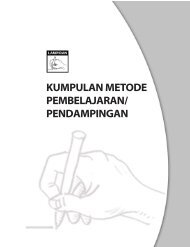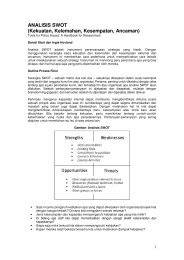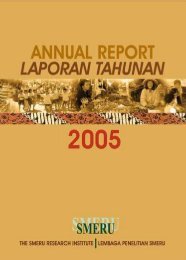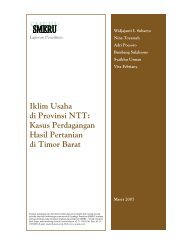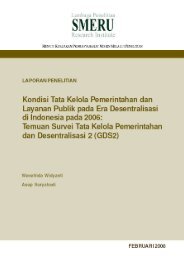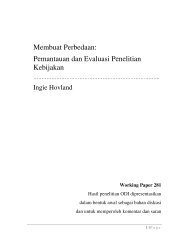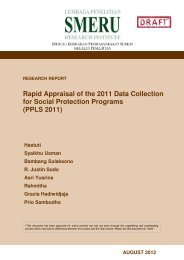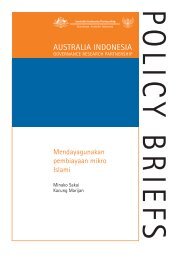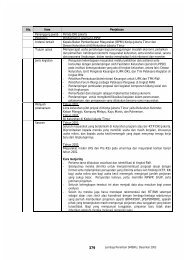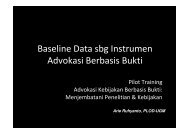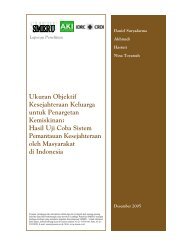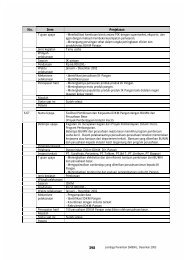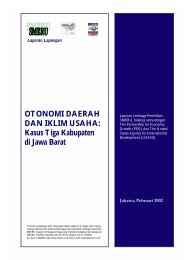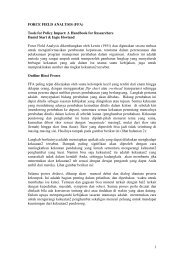Download Report (1.1 MB, PDF) - SMERU Research Institute
Download Report (1.1 MB, PDF) - SMERU Research Institute
Download Report (1.1 MB, PDF) - SMERU Research Institute
Create successful ePaper yourself
Turn your PDF publications into a flip-book with our unique Google optimized e-Paper software.
Laporan Tahunan 2 0041
2Lembaga a Penelitian <strong>SMERU</strong>S M E R U R e s e a r c h I n s t i t u t eLaporan Tahunan 2 004
3About <strong>SMERU</strong><strong>SMERU</strong> is an independent institution for researchand policy studies which professionally and proactivelyprovides accurate and timely information as well asobjective analysis on various socioeconomic and povertyissues considered most urgent and relevant for thepeople of Indonesia.With the challenges facing Indonesian society in poverty reduction,social protection, social sector improvement, development indemocratization processes, and the implementation ofdecentralization, there continues to be a pressing need forindependent studies of the kind that <strong>SMERU</strong> has been providing.Vision• <strong>SMERU</strong> aims to provide information andanalysis to contribute to widening publicpolicy dialogue on the solutions tosocioeconomic, poverty and vulnerabilityto poverty issues directly relating to thewelfare of the Indonesian people.• <strong>SMERU</strong> endeavors to strengthen the roleof the community in the formulation andimplementation of public policies.Mission• To carry out research on socioeconomicand poverty issues for the purpose ofimproving public policies and theirimplementation.• To develop alternative models for publicpolicies and their implementation.• To provide accurate and timely informationon socio-economic, poverty and vulnerabilityto poverty issues, as well as related publicpolicies and their implementation.This will, be achieved through activecontact with, and early dissemination of,research results to civil society groups, thegovernment, and international agencies.Laporan Tahunan 2 004
4Tententang <strong>SMERU</strong>L e mbaga Penelitian <strong>SMERU</strong> adalah sebuah lembaga independenyang melakukan penelitian dan pengkajian kebijakan publik secaraprofesional dan proaktif, serta menyediakan informasi akurat, tepatwaktu, dengan analisis yang objektif mengenai berbagai masalahsosial-ekonomi dan kemiskinan yang dianggap mendesak dan pentingbagi rakyat Indonesia.Melihat tantangan yang dihadapimasyarakat Indonesia dalam upayapenanggulangan kemiskinan, perlindungansosial, perbaikan sektor sosial,pengembangan demokrasi, danpelaksanaan desentralisasi, makakebutuhan terhadap kajian independensebagaimana yang dilakukan oleh <strong>SMERU</strong>selama ini sangatlah diperlukan.Visi• <strong>SMERU</strong> berusaha menyediakan informasidan analisis untuk memperluas dialogkebijakan publik tentang pemecahanmasalah sosial-ekonomi dan kemiskinanserta kerentanan terhadap kemiskinanyang menyangkut kesejahteraanmasyarakat Indonesia.• <strong>SMERU</strong> berupaya meningkatkan perananmasyarakat dalam proses perumusan danpelaksanaan kebijakan publik.Misi• Melakukan penelitian mengenaiberbagai persoalan sosial-ekonomi dankemiskinan guna memperbaiki kebijakanpublik dan pelaksanaannya.• Mengembangkan model-model alternatifkebijakan publik serta pelaksanaannya.• Menyediakan informasi akurat dantepat waktu mengenai masalah sosialekonomi,kemiskinan dan kerentananterhadap kemiskinan, dan kebijakanpublik dan pelaksanaannya. Hal inidilakukan melalui kontak aktif sertapenyebarluasan hasil penelitian kepadaberbagai kelompok masyarakat sipil,pemerintah, dan lembaga internasional.Laporan Tahunan 2 004
9The People InsideBoard of Governors/Badan PengurusFounders/Badan PendiriDr. Sudarno Sumarto(<strong>SMERU</strong> <strong>Research</strong> <strong>Institute</strong>, Jakarta)Dr. Syaikhu Usman(<strong>SMERU</strong> <strong>Research</strong> <strong>Institute</strong>, Jakarta)Ir. Sri Kusumastuti Rahayu, M.Ec.(<strong>SMERU</strong> <strong>Research</strong> <strong>Institute</strong>, Jakarta)Bambang Soelaksono, S.H., M.M.(<strong>SMERU</strong> <strong>Research</strong> <strong>Institute</strong>, Jakarta)Dr. John Maxwell(ANTARA-AusAID Program, Kupang)Dr. Thee Kian Wie(Indonesian <strong>Institute</strong> of Sciences, Jakarta)Gregory Churchill, JD(Ali Budiarjo, Nugroho, Reksodiputro Counsellorsat Law, Jakarta)Dr. Zohra Andi Baso(South Sulawesi Consumer Organization,Makassar)Dr. Joan Hardjono(Independent <strong>Research</strong>er, Bandung)Dr. Ilyas Saad(GIAT Project of USAID, Jakarta)Dr. Syarief Hidayat(Indonesian <strong>Institute</strong> of Sciences, Jakarta)Dr. Boen Setiawan(PT. Kalbe Farma, Jakarta)Ir. Palgunadi T. Setyawan(ABAC, Indonesia Secretariat, Jakarta)Dr. Asep Suryahadi(<strong>SMERU</strong> <strong>Research</strong> <strong>Institute</strong>, Jakarta)Dra. Nuning Akhmadi, M.Sc.(<strong>SMERU</strong> <strong>Research</strong> <strong>Institute</strong>, Jakarta)Ir. Widjajanti Isdijoso S. M.Ec.(<strong>SMERU</strong> <strong>Research</strong> <strong>Institute</strong>, Jakarta)Laporan Tahunan 2 004
10Orang-orang-orang <strong>SMERU</strong>Advisory Board/Badan PenasehatMs. Laura E. Bailey, M.P.P.(Innovative Resource Partners, Montana)Dr. Boediono(Faculty of Economics, Gadjah Mada University,Yogyakarta)Dr. Tubagus Feridhanusetyawan(International Monetary Fund, Washington D.C.)Prof. James J. Fox(<strong>Research</strong> School of Pacific and Asian Studies,Australian National University, Canberra)Dr. Joan Hardjono(Independent <strong>Research</strong>er, Bandung)Dr. Thee Kian Wie(Indonesian <strong>Institute</strong> of Sciences, Jakarta)Dr. Mohamad Ikhsan(<strong>Institute</strong> for Economic and Social <strong>Research</strong>,University of Indonesia, Jakarta)Dr. Alexander Irwan(The TIFA Foundation, Jakarta)Dr. Chris Manning(Indonesia Project, Australian NationalUniversity, Canberra)Prof. Gustav F. Papanek(Boston <strong>Institute</strong> for Developing Economies, Boston)Dr. Lant H. Pritchett(Kennedy School of Government, HarvardUniversity, Cambridge, M.A.)Prof. M. Sadli(Indonesia Forum, Jakarta)Dr. Henry M. Sandee(Vrije Universiteit, Amsterdam)Dr. Solita Sarwono(Freelance Consultant, Wassenaar)Mr. Soedarpo Sastrosatomo(Samudera Indonesia Group, Jakarta)Prof. Gavin W. Jones(Asia <strong>Research</strong> <strong>Institute</strong>,National University of Singapore)Laporan Tahunan 2 004
11The People InsideManagement/ManajemenSudarno SumartoDirector/DirekturPh.D. - Vanderbilt UniversityLuddette Maria Torno(Resigned in July 2004)External Affairs/Hubungan LuarM.Sc. - University of the Philippines<strong>Research</strong>ers/PenelitiSyaikhu UsmanSenior <strong>Research</strong>er/Peneliti SeniorPh.D. - Cornell UniversitySri Kusumastuti RahayuSenior <strong>Research</strong>er/Peneliti SeniorM.Ec. -North Carolina State UniversityBambang SulaksonoSenior <strong>Research</strong>er/Peneliti SeniorM.M. - University of IndonesiaWidjajanti Isdijoso S.Senior <strong>Research</strong>er/Peneliti SeniorM.Ec.- University of QueenslandRuly Marianti(Commenced in October 2004)Senior <strong>Research</strong>er/Peneliti SeniorPh.D. - University of AmsterdamHastuti<strong>Research</strong>er/PenelitiS1 degree - Bogor <strong>Institute</strong> of AgricultureAkhmadi<strong>Research</strong>er/PenelitiS1 degree - Gajah Mada UniversitySri Budiyati<strong>Research</strong>er/PenelitiS1 degree - University of IndonesiaWawan Munawar<strong>Research</strong>er/PenelitiS1 degree - ITENASAsep SuryahadiDeputy Director/Wakil DirekturPh.D. - Australian National UniversityManasi Bhattacharyya(Commenced in August 2004)External Affairs/Hubungan LuarM.Sc., M.Phil. - University of CalcuttaNina Toyamah<strong>Research</strong>er/PenelitiS1 degree - Bogor <strong>Institute</strong> of AgricultureSulton Mawardi<strong>Research</strong>er/PenelitiM.Comm. - University of WollongongVita Febriany<strong>Research</strong>er/PenelitiM.A. - Bandung <strong>Institute</strong> of TechnologyWenefrida Widyanti(Resigned in August 2004)<strong>Research</strong>er/PenelitiS1 degree - Gajah Mada UniversityAlexander Arifianto<strong>Research</strong>er/PenelitiM.A. - Brandeis UniversityRizki Fillaili<strong>Research</strong>er/PenelitiM.A. - <strong>Institute</strong> of Social StudiesDaniel Suryadarma<strong>Research</strong>er/PenelitiM.A. - University of TorontoDaniel PerwiraJunior <strong>Research</strong>er/Peneliti MudaS1 degree - Bogor <strong>Institute</strong> of AgricultureRima Prama Artha(Resigned in December 2004)Junior <strong>Research</strong>er/Peneliti MudaS1 degree - University of IndonesiaLaporan Tahunan 2 004
12Orang-orang-orang <strong>SMERU</strong>Publications and Information Team/Tim Publikasi dan InformasiNuning AkhmadiPublications & Information Coordinator/Koordinator Publikasi & InformasiM.Sc - Cornell UniversityLiza HadizAssistant Editor/Asisten EditorS1 degree - University of IndonesiaRobert Justin SodoAssistant Editor/Asisten EditorS1 degree - Sanata Dharma UniversityKathryn Sadler(Assignment Completed December 2004)Translator/PenerjemahB.Comm./B.A.- University of Western AustraliaChris Stewart(Commenced in September 2004)Translator/PenerjemahM.A. - Griffith UniversityMona SintiaPublications & Communications Officer/Staf Publikasi dan KomunikasiS1 degree - Bogor <strong>Institute</strong> of AgricultureMirna WildaniSenior Administrator/Staf Administrasi SeniorS1 degree - University of IndonesiaBambang Cahyono Hadi(Resigned in September 2004)Computer System Officer/Staf Sistem KomputerS1 degree - Bandung <strong>Institute</strong> of TechnologyDili Syahroni Timor(Commenced in September 2004)Information Technology/Staf Sistem KomputerS1 degree - University of DiponegoroHariyanti SadalyNGO Partnership Officer/Staf Kemitraan dengan OrnopS1 degree - Bogor <strong>Institute</strong> of AgricultureSufiet ErlitaLibrarian/PustakawanS1 degree - University of IndonesiaAdministration and Finance Team/Tim Administrasi dan KeuanganMardianiAdministrative Assistant/Asisten AdministrasiDiploma III - Borobudur UniversityHesti MarsonoAccounting Officer/Staf AkuntansiB.Comm.- Australian National UniversityRusky AviandhiFinance Officer/Staf KeuanganS1 degree - Trisakti UniversitySupriyadiOperational Assistant/Asisten OperasionalSenior High SchoolLaporan Tahunan 2 004
13<strong>Research</strong> HighlightsSAADPThe Sulawesi Agricultural Area DevelopmentProject (SAADP) is an economic-commercialproject to reduce poverty in Central andSoutheast Sulawesi. The project was fundedby a World Bank loan, and implementedbetween August 1996 and December 2003.Since 1999 the focus of the project has beentargeted at local community initiatives (IMS)with an emphasis on microfinance activities,that are managed at the village level by theVillage Finance/Activities Management Unit(UPKD).At the request of the World Bank, fromFebruary to May 2004 the <strong>SMERU</strong> <strong>Research</strong><strong>Institute</strong> undertook research on SAADP to:evaluate its economic and social impact;investigate the implementation process at thelocal level; and study the experience ofSAADP in the framework of policydevelopment and planning future activities.The research used a combination ofqualitative and quantitative methods and wascarried out in four kabupaten, namelyDonggala and Tolitoli in Central SulawesiProvince as well as Konawe Selatan andMuna in Southeast Sulawesi Province. Ineach kabupaten, three villages that hadparticipated in SAADP were selected assample areas, also one village as onecontrol village. There were a total of 618respondent households, consisting of 408SAADP households, 90 control householdsliving in the SAADP villages and 120 controlhouseholds in control villages. Samplehouseholds were chosen randomly, exceptfor control households in the SAADP villagesthat were selected purposively.Based on the evaluation results, it can beconcluded that the success of the SAADPproject is the result of the development ofthe UPKD, the implementation mechanismand its impact on community socio-economicaspects that varies between research areas.Nevertheless, the SAADP project has overallbeen less than successful because mostUPKDs are not running smoothly and theimpact of the project on the community'ssocio-economic condition is relatively minor.Considering the many ongoing weaknessesin project implementation, that anunderperforming UPKD can influence theperformance of other UPKDs, the relativelylarge amount of resources and fundsalready spent and the fact that the presenceof UPKDs is also still felt to be important bythe community, if the SAADP project is to becontinued, it should focus on reviving,improving and expanding the existingUPKDs so that they can provide an examplefor future project implementation.•Laporan Tahunan 2 004
15<strong>Research</strong> HighlightsVERIFICATION OF POVERTY MAPPING II<strong>SMERU</strong> has developed a poverty map for30 provinces of Indonesia that estimatespoverty figures disaggregated down to thevillage level using econometric modelingbased on Susenas 1999, Podes 1999 andPopulation Census 2000 data. This mappingexercise was carried out so that programimplementers could better determine thetarget for poverty reduction and socialprotection programs. A field verification studywas conducted to assess whether themapping study using secondary data couldcapture the actual poverty condition. Thestudy attempted to understand the realdimensions of poverty, rank the regions(kabupaten, kecamatan and villages)according to their poverty condition andcompare them with rankings based onquantitative estimates.Since poverty conditions are best understoodby local people, this study adopted aparticipatory approach. The data wasprimarily collected through focus groupdiscussions (FGDs) conducted at theprovince, kabupaten, kecamatan and villagelevels. The main information collectedthrough focus group discussions wascomplemented by a review of secondarydata, interviews with key informants atkecamatan and village levels, and directobservation at the village level. The studyfound that the poverty rankings acrosskabupaten and kecamatan by small-areaestimation method are reasonably consistentwith the rankings generated through FGDs,but less consistent at the village level. Thusthe study suggests that small-area povertyestimates at the village level should be usedcautiously and it is advisable to verify themusing qualitative measures such as FGD ordirect observations.The preliminary findings have been presentedat the International Conference on MappingPoverty in Southeast Asia jointly organized bythe <strong>SMERU</strong> <strong>Research</strong> <strong>Institute</strong> and the FordFoundation in Jakarta on 1-2 December2004, and at the Regional Workshop entitled"Study on Small-Area Poverty Estimation"organized by <strong>SMERU</strong> in collaboration with the<strong>Research</strong> Center of Mataram University inLombok, on 20 December 2004. Anotherregional workshop was organized jointly withthe University of Sam Ratulangi, Manado on31 January 2005 to present the findings ofthis study. The report will be disseminated tothe public and other relevant agencies andinstitutions. •Laporan Tahunan 2 004
16Sorotan an PenelitianVERIFIKASI PEMETAAN KEMISKINAN II<strong>SMERU</strong> telah menyusun peta kemiskinanuntuk 30 provinsi di Indonesia yangmengestimasi angka kemiskinan yang terincihingga ke tingkat desa dengan menggunakanmodel ekonometrik berdasarkan data Susenas1999, Podes 1999 dan Sensus Penduduk2000. Pemetaan ini dilakukan agar pelaksanaprogram dapat menetapkan sasaran programpenanggulangan kemiskinan danperlindungan sosial dengan lebih baik. Studiverifikasi lapangan dilakukan untuk melihatapakah studi pemetaan denganmenggunakan data sekunder mampumenangkap kondisi kemiskinan yangsebenarnya. Studi ini berupaya memahamidimensi kemiskinan yang sesungguhnya,urutan wilayah-wilayah (kabupaten,kecamatan dan desa) sesuai dengan kondisikemiskinannya dan membandingkan urutanwilayah tersebut dengan urutan berdasarkanestimasi kuantitatif.Karena kondisi kemiskinan lebih dipahamioleh kaum miskin itu sendiri, studi inimenggunakan pendekatan partisipatoris.Data penelitian terutama dikumpulkanmelalui Diskusi Kelompok Terarah (FGD) ditingkat provinsi, kabupaten, kecamatan dandesa. Informasi utama yang dihimpun melaluidiskusi kelompok ini dilengkapi dengantinjauan data sekunder, wawancara denganinforman kunci di tingkat kecamatan dandesa, dan pengamatan langsung di tingkatdesa. Studi ini menemukan bahwa urutantingkat kemiskinan di semua kabupaten dankecamatan dengan metode estimasi wilayahkecil cukup konsisten dengan urutan yangdiperoleh melalui Diskusi Kelompok Terarah,tetapi kurang konsisten di tingkat desa.Dengan demikian, studi ini menunjukkanbahwa estimasi kemiskinan di wilayah kecildi tingkat desa harus digunakan denganpenuh kehati-hatian. Disarankan estimasitersebut diverifikasi dengan menggunakanpendekatan kualitatif, misalnya melaluiDiskusi Kelompok Terarah atau pengamatanlangsung di lapangan.Temuan awal studi ini telah dipresentasikan diKonferensi Internasional "Mapping Poverty inSoutheast Asia", kerja sama antara LembagaPenelitian <strong>SMERU</strong> dan Ford Foundation diJakarta pada 1-2 Desember 2004, juga diLokakarya Daerah dengan topik "Studimengenai Estimasi Kemiskinan Wilayah Kecil"yang diselenggarakan oleh <strong>SMERU</strong> bekerjasama dengan Lembaga Penelitian UniversitasMataram di Lombok pada 20 Desember2004. Sebuah lokakarya daerah jugadiadakan bersama Universitas Sam Ratulangidi Manado pada 31 Januari 2005 untukmengangkat temuan studi ini. Laporan iniakan disebarluaskan kepada publik,lembaga atau badan terkait. •Laporan Tahunan 2 004
17<strong>Research</strong> HighlightsLESSONS LEARNED FROM MICROFINANCESERVICES IN EAST NUSA TENGGARA (NTT)Microfinance is considered an importantand effective tool for poverty reduction. InIndonesia, the microfinance movement hasalready gained momentum, andmicrofinance schemes have been providedby various types of formal and informalfinancial institutions.East Nusa Tenggara (NTT) is known as oneof the least-developed provinces inIndonesia. For this reason, various aidprograms, including microfinance schemes,have been developed in this province. Itremains to be proven, however, whethermicrofinance schemes are an effectiveinstrument for poverty reduction in NTT.<strong>SMERU</strong> sees the need to undertake a furtherinvestigation of these schemes.The objectives of the study are firstly, toassess the effectiveness of microfinanceschemes in NTT and document the lessonsthat can be learnt, and, secondly, to identifythe unmet demand for microfinance services.With regard to the methodology, the studyadopted a qualitative approach. The fieldresearch team conducted interviews usingguiding questions to collect information atthe provincial, kabupaten/kota, kecamatan,and village levels. At the village level, theteam also conducted in-depth interviewswith respondents who participated in thescheme as well as those who did not.Kabupaten Kupang and Manggarai wereselected as sample districts based on thepresence of microfinance services and othersocioeconomic criteria.This study found that inadequate resourcesand infrastructure, a lack of proper skillsand knowledge, poor access to markets anda lack of marketable surplus prevent thepoor in NTT from benefiting frommicrofinance schemes or becomingengaged in income-generating activities.Microfinance services alone are insufficientto improve the economic status of the poorin NTT. This study suggests that othersectoral activities need to be developedbefore providing the poor with microfinanceservices. The study findings have beendisseminated among government agencies,non-government organizations and otherstakeholders. •Laporan Tahunan 2 004
18Sorotan an PenelitianPELAJARAN BERHARGA DARI PELAYANANKEUANGAN MIKRO DI NUSA TENGGARA TIMUR (NTT)Keuangan mikro dianggap sebagaiinstrumen penting dan efektif bagi upayapenanggulangan kemiskinan. Di Indonesia,gerakan keuangan mikro telah mencapaimomentum yang tepat, dan skema keuanganmikro telah disediakan oleh beragamlembaga keuangan mikro baik formalmaupun informal.Nusa Tenggara Timur (NTT) dikenal sebagaisalah satu provinsi termiskin di Indonesia. Atasdasar itulah, berbagai program bantuantermasuk skema keuangan mikro telahdikembangkan di provinsi ini. Namun, tetapperlu dibuktikan apakah skema keuangan mikromerupakan instrumen yang efektif bagi upayapenanggulangan kemiskinan di NTT. <strong>SMERU</strong>melihat adanya kebutuhan untuk mengkaji ulangskema keuangan mikro yang ada.Tujuan dari studi ini adalah, pertama, untukmengkaji efektivitas skema keuangan mikro diNTT dan mendokumentasikan pelajaranpelajaranberharga yang dapat dipetik, dankedua, untuk mengidentifikasi permintaanpelayanan keuangan mikro yang belumterpenuhi. Berkaitan dengan metodologiyang digunakan, studi ini menerapkanpendekatan kualitatif. Tim penelitilapangan melakukan wawancara denganmenggunakan panduan pertanyaan untukmengumpulkan informasi di tingkatprovinsi, kabupaten/kota, kecamatan dandesa. Di tingkat desa, tim juga melakukanwawancara mendalam dengan respondenyang ikut maupun yang tidak dalam skemakeuangan mikro. Kabupaten Kupang danManggarai dipilih sebagai sampel kabupatenberdasarkan adanya pelayanan keuanganmikro dan kriteria sosial-ekonomi lainnya.Studi ini menemukan bahwa sumber dayadan infrastruktur yang kurang memadai,kurangnya ketrampilan dan pengetahuan,akses pasar yang minim dan rendahnyasurplus yang dapat dipasarkan telahmenghambat kelompok miskin di NTT untukmendapat manfaat dari skema keuanganmikro atau terlibat dalam kegiatanpeningkatan pendapatan. Dapatdisimpulkan bahwa pelayanan keuanganmikro saja tidaklah cukup untukmeningkatkan status ekonomi kelompokmiskin di NTT. Studi ini menyarankan agarkegiatan sektor lain perlu dikembangkansebelum menyediakan pelayanan keuanganmikro bagi kelompok miskin. Temuan studiini telah disebarluaskan di antara lembagapemerintah dan Ornop serta pemangkukepentingan lainnya. •Laporan Tahunan 2 004
19<strong>Research</strong> HighlightsWHEN TEACHERS ARE ABSENT:WHERE DO THEY GO AND WHAT IS THE IMPACTON THE STUDENTS?This report presents the results of a surveyconducted in 10 kabupaten on primaryeducation in Indonesia. The reportspecifically looks at teacher absenteeism andits effect on students. By determining thecorrelation between teacher absenteeismand the characteristics of individual teachers,schools and areas, the report providesnational policy-makers with information onabsenteeism, its effects and how to addressit. This research is the first of its kind inIndonesia.student-teacher ratios that are either too lowor too high are detrimental to studentperformance; and 7) student test results arelower if their teacher has additional jobs.The findings of this study have been used asthe basis for follow-up studies: "EducationBudget Allocation in the Regional AutonomyEra: Its Implication for the Management ofPrimary Education Services" and "TheDeterminants of Student Performance inIndonesian Public Primary Schools: The Roleof Teachers and Schools." •The research work drew a number ofconclusions, including, inter alia: 1)Indonesia's public primary school teachershave an absenteeism rate of 19%; 2)absenteeism is significantly lower amongstfemale teachers; 3) the absenteeism rate issignificantly higher amongst contract andcasual teachers; 4) school facilities play animportant role in teacher absenteeism; 5)students in rural schools perform significantlypoorer in mathematical and literacy testscompared to students in urban schools; 6)Laporan Tahunan 2 004
20Sorotan an PenelitianKETIKA GURU ABSEN:KEMANA MEREKA DAN BAGAIMANA MURID?Laporan ini menyajikan hasilsurvei yang dilaksanakan di 10kabupaten mengenai pendidikandasar di Indonesia. Laporan iniutamanya meneliti ketidakhadiranguru dan dampaknya terhadapmurid. Dengan menetapkankorelasi antara ketidakhadiranguru dan karakteristik individu guru, sekolahdan wilayah, laporan ini memberikaninformasi bagi para pembuat kebijakannasional mengenai ketidakhadiran guru,dampaknya dan bagaimana masalah inidapat diatasi. Penelitian dengan topik ini barupertama kali dilakukan di Indonesia.Penelitian ini menghasilkan sejumlahkesimpulan, antara lain: 1) rata-rataketidakhadiran guru sekolah dasar negeri diIndonesia adalah 19%; 2) ketidakhadiranguru secara signifikan lebih rendah di antaraguru perempuan; 3) rata-rata ketidakhadiransecara signifikan lebih tinggi di antara gurukontrak dan guru honorer; 4) fasilitas sekolahberperan penting dalam ketidakhadiran guru;5) kinerja murid di perdesaan dalam testmatematika dan bahasa secara signifikanlebih rendah dibandingkan dengan murid diperkotaan; 6) Perbandingan antara guru danmurid yang terlalu rendah atau terlalu tinggiberakibat buruk terhadap kinerja murid; dan7) hasil test murid lebih rendah bila gurumereka mempunyai pekerjaan sampingan.Temuan studi ini telah digunakan sebagaidasar untuk studi-studi <strong>SMERU</strong> berikutnya,yaitu: "Alokasi Anggaran Pendidikan di EraOtonomi Daerah: Implikasinya terhadapPengelolaan Pelayanan Pendidikan Dasar"dan "Penentu Kinerja Murid di SekolahDasar Negeri Indonesia: Peran Guru danSekolah." •Laporan Tahunan 2 004
21<strong>Research</strong> HighlightsSOCIAL SECURITY REFORM IN INDONESIA:AN ANALYSIS OF THE NEW NATIONAL SOCIALSECURITY LAW NO 40/2004<strong>SMERU</strong>'s study on Indonesia's social securityreform legislation is an extension of <strong>SMERU</strong>'sfocus on poverty reduction in the country. It isrecognized that an effective social securitysystem could help alleviate poverty. Theemerging consensus among social securityexperts worldwide however, is that while socialsecurity provision is important to help alleviatepoverty, it should be developed carefully andgradually so as not to inhibit economic growthand labor market flexibility, and as much aspossible should be provided through acompetitive market.The Indonesian government has recentlypassed a new national social security law(Law No. 40 of 2004), which supportershave boasted would make the existing socialsecurity system work better, providing morebenefits for the beneficiaries, and wouldextend the social security coverage to moreworkers, both in the formal and informalsectors. Opponents have however, voicedconcerns that the new law has too manyweaknesses. <strong>SMERU</strong>'s research is anattempt to critically analyze the new law andto predict its possible impacts on Indonesianworkers and the economy in general.From our analysis, we conclude that thereare several potentially serious problems inthe government plan as outlined in the newlaw, such as: it could worsen labor marketconditions, might be financiallyunsustainable, could create negativepressures on the state budget and does notallow competition in the provision of socialsecurity benefits because the program wouldbe administered as a public monopoly. Thisis in contrast to the consensus that apublicly provided social security scheme isno longer a viable model. Instead, moreevidence has emerged from both developedand developing countries to indicate thatprivately provided social security schemesare, in general, better suited to workers'retirement needs.In conclusion, we propose that Indonesiashould seriously consider adopting a socialsecurity scheme based on the widely usedthree-pillar system consisting of public socialsafety nets, private social security accountsand individual savings, in order to reform thecurrent social security system in Indonesia. •Laporan Tahunan 2 004
22Sorotan an PenelitianREFORMASI JAMINAN SOSIAL DI INDONESIA:ANALISIS UU NO 40/2004 TENTANGJAMINAN SOSIAL NASIONAL YANG BARUStudi <strong>SMERU</strong> mengenai reformasi peraturanperundangan jaminan sosial pemerintahIndonesia adalah perluasan dari fokus<strong>SMERU</strong> terhadap penanggulangankemiskinan di negeri ini. Diakui bahwa sistemjaminan sosial yang efektif akan mampumenanggulangi kemiskinan. Namun,konsensus yang muncul di antara para pakarjaminan sosial di berbagai penjuru duniaadalah bahwa meskipun penyediaan jaminansosial dianggap penting untukmenanggulangi kemiskinan, jaminan sosialharus dikembangkan dengan hati-hati dansecara bertahap agar tidak menghambatpertumbuhan ekonomi atau mengganggufleksibilitas pasar tenaga kerja, dan sedapatmungkin harus diberikan melalui mekanismepasar yang kompetitif.Pemerintah Indonesia baru-baru inimengesahkan UU No 40/2004 tentangJaminan Sosial Nasional yang digembargemborkanpendukungnya bahwa UUtersebut akan menjadikan sistem jaminansosial yang sudah ada berjalan lebih baik,memberikan manfaat lebih besar padapenerima program, dan akan memperluasjangkauan layanan jaminan sosial kepadalebih banyak pekerja, baik dari sektor formalmaupun informal. Namun, mereka yang tidakmenyetujui berpendapat bahwa UU yang baruini mengandung terlalu banyak kelemahan.Penelitian <strong>SMERU</strong> ini adalah suatu upayauntuk menganalisis secara kritis UU yang baruini dan berusaha memperkirakan dampaknyaterhadap pekerja Indonesia danperekonomian Indonesia secara umum.Kesimpulan analisis kami menunjukkanbahwa ada beberapa masalah potensialserius dalam rencana pemerintahsebagaimana tercantum dalam UU yangbaru, antara lain: UU baru Jaminan SosialNasional dapat memperburuk kondisi pasartenaga kerja, mungkin secara finansial tidakberkesinambungan, akan menciptakantekanan negatif terhadap APBN, dan tidakmemungkinkan munculnya persaingandalam pengadaan manfaat jaminan sosialkarena program tersebut dilaksanakansebagai sebuah monopoli negara. Hal iniberlawanan dengan konsensus bahwaskema jaminan sosial yang diselenggarakanoleh negara bukan lagi model yang baik.Semakin banyak bukti muncul baik darinegara-negara maju maupun sedangberkembang yang menunjukkan bahwaskema jaminan sosial yang dikelola pihakswasta umumnya lebih sesuai dengankebutuhan pekerja setelah pensiun.Sebagai kesimpulan, kami mengusulkanagar pemerintah Indonesia secara seriusmempertimbangkan menggunakan skemajaminan sosial berdasarkan sistem tiga pilaryang sudah diterapkan secara meluas, yaituyang terdiri dari jaring pengaman jaminansosial, akun jaminan sosial yangdiselenggarakan sektor swasta, dantabungan individu, untuk mereformasisistem jaminan sosial yang saat ini berlakudi Indonesia. •Laporan Tahunan 2 004
23Progogram am HighlightsPUBLICATIONS AND INFORMATION DIVISIONon Poverty Reduction" in the form of a CD-Romin early 2004, <strong>SMERU</strong> is also distributing itsresearch output in this format as well as inprint, for example, "Efforts at Strengthening Smalland Micro Enterprises between 1997-2003."The CD-Rom versions of "Poverty Mapping"and "Training Manual on <strong>Research</strong>Mothodology” have also been producedand was distributed in January 2005.Publications and Information:The Spearhead of <strong>SMERU</strong>In comparison with earlier years, the volumeof research and other activities of <strong>SMERU</strong>'sresearchers in 2004 increased rapidly, hencedirectly spurring the performance of thePublications and Information Division. During2004 the Publications Division published sixworking papers, five research reports, fourfield reports, one manual of trainingmaterial, three workshop proceedings, fournewsletters, <strong>SMERU</strong>'s 2003 Annual <strong>Report</strong>, apolicy brief on Poverty Reduction Efforts andthe newest <strong>SMERU</strong> brochure.Following the involvement of <strong>SMERU</strong> intraining activities for NGOs, the <strong>SMERU</strong><strong>Research</strong> <strong>Institute</strong> produced its latestpublishing innovation: "A Training Manual on<strong>Research</strong> Methodology for NGOs". Thismanual represents a series of modules of thetraining material given to 20 NGOs between24-27 May 2004. This manual will bedisseminated shortly to various other NGOsacross Indonesia as a soft copy in pdf format.In addition to these achievements, theEditing Team also assisted the ManagementTeam to produce quarterly reports, semesterreports, annual reports for the PCC (ProjectConsultation Committee) as well as proofreadingand translating seminar papers and<strong>SMERU</strong> memoranda. Several <strong>SMERU</strong> reportsand articles were published in a number ofbooks and newspapers, both in Indonesiaand overseas, including the AusAIDmagazine “Focus”, the Apakabar mailing listand “The Jakarta Post”. A <strong>SMERU</strong> reportentitled “Governance and Poverty Reduction:Evidence from Newly DecentralizedIndonesia" forms one of the chapters in abook entitled "The Role of Governance inAsia” edited by Yasutami Shimomura andpublished by the <strong>Institute</strong> of Southeast AsianStudies (ISEAS).As the spearhead of <strong>SMERU</strong>, thePublications and Information Division willcontinually strive to improve its performance. •Given the benefits, effectiveness and ease ofdistributing the "Basic Information PackageLaporan Tahunan 2 004
24Sorotan an ProgogramamBIDANG PUBLIKASI DAN INFORMASIPublikasi dan Informasi:Ujung Tombak <strong>SMERU</strong>Dibandingkan dengan tahun-tahunterdahulu, jumlah kegiatan penelitian dankegiatan lain peneliti <strong>SMERU</strong> pada tahun2004 meningkat pesat, sehingga secaralangsung memacu kinerja Divisi Publikasi danInformasi. Sepanjang 2004 Divisi Publikasiberhasil menerbitkan enam kertas kerja, limalaporan penelitian, empat laporan lapangan,satu materi pelatihan, tiga prosidinglokakarya, empat buletin, laporan tahunan,dan brosur terbaru <strong>SMERU</strong>.Produk publikasi Lembaga Penelitian <strong>SMERU</strong>yang menjadi terobosan terbaru menyusulketerlibatan <strong>SMERU</strong> dalam kegiatan pelatihanOrnop adalah "Manual Training MetodologiPenelitian bagi Ornop". Manual ini merupakanhasil rangkuman dari seluruh materi pelatihanyang pernah diberikan kepada20 Ornop pada 24-27 Mei2004. Manual ini akan segeradisebarluaskan ke berbagaiOrnop lain di Indonesia dalambentuk soft copy pdf.Melihat manfaat, efektivitas dankemudahan ketikamenyebarluaskan "Paket InformasiDasar tentang PenanggulanganKemiskinan" dalam bentuk CD-Rom pada awal tahun 2004, kiniselain didistribusikan sebagaibarang cetakan <strong>SMERU</strong> jugamenyebarluaskan publikasi lainnyadalam bentuk CD-Rom, misalnya"Upaya-upaya Penguatan UsahaMikro dan Usaha Kecil, Tahun1997-2003." Versi CD-Rom untuk"Poverty Mapping" dan "Manual PelatihanMetodologi Penelitian" juga telahdisebarluaskan pada Januari 2005.Selain itu, Tim Editor juga membantu TimManajemen <strong>SMERU</strong> menyusun laporan tigabulanan, laporan semester, laporan tahunanuntuk PCC (Project Consultation Committee),serta menyunting dan menerjemahkanmakalah seminar dan memorandum <strong>SMERU</strong>.Sejumlah laporan dan artikel <strong>SMERU</strong> telahdimuat dalam beberapa buku dan suratkabar baik dalam maupun luar negeri, diantaranya dalam majalah Focus AusAID,milis Apakabar dan koran The Jakarta Post.Laporan <strong>SMERU</strong> berjudul "Tata KelolaPemerintahan dan Upaya PenanggulanganKemiskinan: Bukti-bukti Awal Desentralisasidi Indonesia (telah menjadi salah satu babdalam buku yang berjudul "The Role ofGovernance in Asia" yang diedit YasutamiShimomura and diterbitkan The <strong>Institute</strong> ofSoutheast Asian Studies (ISEAS).Sebagai ujung tombak <strong>SMERU</strong>, Divisi Publikasidan Informasi akan terus meningkatkankinerjanya. •Laporan Tahunan 2 004
25Progogram am HighlightsTHE <strong>SMERU</strong> WEBSITEDuring the reporting period 2004, <strong>SMERU</strong>website statistics recorded as many as40,459 visitors who accessed 77,860pages and 120,566 files from <strong>SMERU</strong>'swebsite. The total capacity of file transfersreached 10Gb (10,013,145 Kb).The abovementioned data indicates that anaverage of 100 information seekers visit the<strong>SMERU</strong> website each day. On average, a visitoraccesses 1-3 files on each visit, and needs 1-2pages to obtain the information they need.A small survey on "The <strong>SMERU</strong> <strong>Research</strong><strong>Institute</strong> for NGOs" with 298 NGONoTitlePeriod January – June 200412345Developing a Poverty Map of Indonesia:An Initiatory Work in Three Provinces,May 2003Governance and Poverty Reduction:Evidence from Newly DecentralizedIndonesia, March 2004Paket Informasi Dasar PenanggulanganKemiskinan, 2001Politik Lokal di Era Desentralisasi:Menuju Otonomi Rakyat, Juli 2003Prosiding Seminar dan Lokakarya RegionalOrnop Riau Mandiri – <strong>SMERU</strong>: RefleksiPelaksanaan Otonomi Daerah danPengelolaan SDA yang Berkelanjutan,Desember 2003Period July – December 200412345Governance and Poverty Reduction:Evidence from Newly DecentralizedIndonesia, March 2004Alokasi Anggaran Pendidikan di EraOtonomi DaerahKetika Guru Absen: Ke Mana Mereka danBagaimana Murid?Developing a Poverty Map for Indonesia:An Initiatory Work in Three Provinces,May 2003Protecting Education for the Poor in Timesof Crisisrespondents from 27 provinces in Indonesiarevealed that 80.95% of respondents hadopened the <strong>SMERU</strong> website to look for data on<strong>SMERU</strong>'s research findings, and 40.95% ofrespondents had downloaded <strong>SMERU</strong>'sresearch reports. These findings show theimportance of the <strong>SMERU</strong> website indisseminating the results of <strong>SMERU</strong>'s research.In the downloading process, the file nameor publication accessed by the visitor isautomatically recorded. The title of<strong>SMERU</strong>'s reports, frequency of downloadsand the home country of the visitors' ispresented in the following table.<strong>Download</strong>Frequency155149Country of OriginAlbania, Antigua and Barbuda, Armenia,Australia, Belgium, Canada, China,Germany, Iceland, Indonesia, Japan,Kenya, Mongolia, Netherlands. NewZealand, Philippines, Spain, United States.Albania, Indonesia, Netherlands, Singapore,United States.130Costa Rica, Indonesia, Malaysia, UnitedStates.106 Afghanistan, American Samoa, Argentina,Australia, Indonesia, Netherlands, NewZealand, United States.99 Angola, Anguilla, Argentina, Australia,Indonesia, Japan, Lao People’s DemocraticRepublic, Netherlands.435 Indonesia, Denmark, United States,Thailand, Bangladesh, Germany, Australia,Afghanistan, Japan, Cambodia, NewZealand, Switzerland, Sweden, Argentina,Singapore, United Kingdom, Pakistan.201 Indonesia, Israel, Germany, Australia,New Zealand.Indonesia, Japan, Germany, Australia143138 Indonesia, United States, Thailand,France, Midway Island, Lao People’sDemocratic Republic, Japan, Germany,Netherlands, India, Afghanistan, Italy,Australia.105 Indonesia, United States, Germany,Netherlands, Norway, Australia.Laporan Tahunan 2 004
26Sorotan an ProgogramamWEBSITE <strong>SMERU</strong>Selama periode pelaporan 2004 datastatistik Website <strong>SMERU</strong> merekamsebanyak 40.459 pengunjung yang telahmengakses 77.860 halaman dan120.566 file dari Website <strong>SMERU</strong>. Totalkepadatan aliran data mencapai 10 GB(10.013.145 KByte).Dari data di atas juga diketahui bahwa setiaphari rata-rata terdapat 100 pencari informasiyang mengunjungi Website <strong>SMERU</strong>. Rata-ratapengunjung mengakses 1-3 file setiapmelakukan kunjungan, dan membutuhkan1-2 halaman untuk mendapat informasiyang diinginkan.Suatu survei kecil mengenai "LembagaPenelitian <strong>SMERU</strong> bagi Ornop" dengan298 responden ornop dari 27 provinsi diIndonesia mengungkapkan bahwa80,95% responden membuka Website<strong>SMERU</strong> untuk mencari data hasil penelitian<strong>SMERU</strong>, dan 40,95% respondenmen-download laporan penelitian <strong>SMERU</strong>.Temuan ini menunjukkan peranan pentingWebsite <strong>SMERU</strong> dalam penyebarluasanhasil penelitian <strong>SMERU</strong>.Dalam proses men-download, nama fileatau publikasi yang diakses olehpengunjung secara otomatis tercatat.Judul laporan <strong>SMERU</strong>, frekuensi downloaddan asal negara pengunjung websitedisajikan dalam tabel berikut ini.Dari: ArmandoLokasi: IndonesiaTanggal: 28 February 2004<strong>SMERU</strong> memiliki data dan analisis yang sangat terpercayaFrom: Bambang SupriyantoLocation: IndonesiaDate: 2 February 2005I am working on my dissertation on industrial relations disputesettlement. Some publications by <strong>SMERU</strong> contain goodreferences for my dissertation. A real professional organization.Laporan Tahunan 2 004
27Progogram am HighlightsThe demographic breakdown of visitors to the<strong>SMERU</strong> website can be seen in the followingchart.There is quite a high number of domains(40%) that can't be identified because asignificant number of internet protocol addressescan't be determined by the <strong>SMERU</strong> websitesystem.The high level of access clearly affects theworkload of the <strong>SMERU</strong> server. This issuedemands a better web page structure and amore accurate system for the managementand development of data toensure the optimal functioningof the website pages. For thatreason, <strong>SMERU</strong> is now developinga back-office system that canimprove the process of updatingsite contents, as well as addingand making interaction easierfor visitors when searching forinformation on the <strong>SMERU</strong>website.The <strong>SMERU</strong> Website also featuresan NGO database. Thedatabase is being continuouslyupdated and can be accessedfree of charge. By the end of2004 the database consisted of2,394 NGOs working in 32provinces across Indonesia.Various national and internationalinstitutions have obtainedinformation from our NGODatabase. •Laporan Tahunan 2 004
28Sorotan an ProgogramamSecara demografis, pengunjung situs <strong>SMERU</strong>dapat dilihat pada grafik berikut ini.21%1%1% 1%2%2%6%2%40%24%Unresolved/Unknown US Commercial IndonesiaNetwork Australia Non-Profit OrganizationNetherlands Japan US EducationalOtherPersentase domain yang tidak teridentifikasicukup signifikan (40%) karena cukup banyakalamat protokol internet tidak dapat dikenalioleh sistem Website <strong>SMERU</strong>.Tingkat akses yang tinggi jelasmempengaruhi beban kerja server Website<strong>SMERU</strong>. Hal ini menuntut pengolahan danpengelolaan struktur data dan halamanwebsite yang lebih akurat agar fungsi-fungsipada halaman-halaman website dapatberjalan dengan baik. Karena itu, kini<strong>SMERU</strong> sedang mengembangkan suatusistem back office yang dapat meningkatkanproses update kandungan situs, sertamenambah dan mempermudah interaksipengunjung ketika mencari informasi diWebsite <strong>SMERU</strong>.Website <strong>SMERU</strong> juga memuat PangkalanData Ornop. Pangkalan data ini terusmenerusdimutakhirkan, dan dapat diaksescuma-cuma. Pada akhir tahun 2004Pangkalan Data Ornop <strong>SMERU</strong> berisiinformasi mengenai 2.394 Ornop yangmelakukan kegiatan di 32 provinsi diIndonesia. Berbagai lembaga nasionalmaupun internasional telah memanfaatkaninformasi dari Pangkalan Data Ornop<strong>SMERU</strong>. •Laporan Tahunan 2 004
29Progogram am Highlights<strong>SMERU</strong> LIBRARYThe <strong>SMERU</strong> library is intended as aninformation gateway and as a learning andresearch facility. One of the ways the libraryis meeting that responsibility is throughworking cooperatively with the libraries ofother institutions such as ILO, UNSFIR andADB in resource sharing and interlibraryloans.In response to the urgent needs of theresearchers, the library enhances thepathfinder service every week in differenttopics. The topics are selected on the basis ofobservation as well as the research interestsof staff. At the end of 2004, the library'scollection totaled 1,713 monographs, 291news clippings and 231 regionalgovernment regulations (Perda). Circulationtransactions indicate that the library service isin significant demand by staff to assist intheir assignments.In order to facilitate the distribution of items,the ISBN numbering format was introducedin 2004 and assigned to each publication inthe collection. Two copies of our researchreports are sent periodically to The NationalLibrary of Indonesia. Publications are alsosent to the Library of Congress representativein Jakarta.The library at the moment oversees the<strong>Research</strong> Travel Information database thatcontains information on hotels, educationalinstitutions, hospitals and clinics, policestations, and any important informationneeded by the researchers while conductingfield research. This year the library hasintroduced the concept of "knowledgemanagement" to the staff of <strong>SMERU</strong>. •Laporan Tahunan 2 004
30Sorotan an ProgogramamPERPUSTAKAAN <strong>SMERU</strong>Perpustakaan <strong>SMERU</strong> berfungsi sebagaipintu gerbang bagi informasi dan sebagaifasilitator bagi pembelajaran dan penelitian.Salah satu cara untuk memenuhi tujuantersebut adalah dengan bekerja samadengan perpustakaan dari institusi sejenisseperti, ILO, UNSFIR, dan ADB dalam halberbagi sumber daya dan jasa silang layan.Untuk membantu kebutuhan mendesak parastaf peneliti, perpustakaan mengirimkanpathfinder secara berkala mengenai topik -topik yang berbeda. Topik dipilih berdasarkanhasil pengamatan dan minat penelitian staf.Di penghujung tahun 2004, koleksiperpustakaan <strong>SMERU</strong> meliputi 1.713monograf, 291 kliping berita dan 231 perda.Transaksi sirkulasi menunjukkan bahwaperpustakaan digunakan lebih banyak untukmembantu tugas para staf.Untuk memperlancar arus distribusi buku,penomoran ISBN diberlakukan pada setiapterbitan <strong>SMERU</strong> terhitung mulai tahun2004. Dua eksemplar hasil penelitiandiberikan ke Perpustakaan NasionalRepublik Indonesia secara berkala.Publikasi <strong>SMERU</strong> juga dikirimkan keperwakilan Perpustakaan Kongres AmerikaSerikat di Jakarta.Saat ini perpustakaan <strong>SMERU</strong> jugabertanggung jawab atas pangkalan dataInformasi Perjalanan Penelitian yangmemuat data mengenai hotel, institusipendidikan, rumah sakit dan klinik, kantorpolisi dan informasi penting lainnya yangdibutuhkan oleh peneliti selama merekaberada di lapangan. Pada tahun 2004 iniperpustakaan <strong>SMERU</strong> telahmemperkenalkan konsep "pengelolaanpengetahuan" pada staf <strong>SMERU</strong>. •Laporan Tahunan 2 004
31Progogram am HighlightsNGO CAPACITY BUILDINGworkshop was held on 14 -16 October 2004in Kupang and attended by around 50participants from 6 kabupaten/kota in NTTwith the Governor of NTT, Bapak Piet A. TalloS.H. as the keynote speaker.In 2004 the NGO Partnership Unit of the<strong>SMERU</strong> <strong>Research</strong> <strong>Institute</strong> succeeded incompleting to several major activity plansmentioned in the previous annual reports. InMay 2004, supported by the TifaFoundation, the Unit arranged training inresearch methodology for 21 participantsfrom 20 NGOs in 14 provinces inIndonesia. The training lasted 4 days andwas facilitated by 7 <strong>SMERU</strong> researchers, 2lecturers from the Indonesian ChristianUniversity and Bogor Agricultural University,4 resource persons from the Pirac, Legal Aid<strong>Institute</strong> (LBH), Wahid <strong>Institute</strong> andPerdamaian Titian Foundation and 1 personfrom Tifa Foundation. The training manual isin the process of being made into a CDversion and will be shared among otherNGOs who didn't have the opportunity toparticipate in this training.To facilitate and increase the role as well as thecritical awareness and capacity of civil societyin East Nusa Tenggara (NTT) in the formulationof pro-poor policy plans and budgets, <strong>SMERU</strong>cooperated with KIKIS and PIAR to arrange aworkshop for NGOs, local governments andthe NTT DPRD with the topic "LocalDevelopment Initiatives for a Public Budgetingand Planning System Based on RegionalPoverty Reduction Strategy (SPKD)". TheTo investigate the role and impact of<strong>SMERU</strong>'s performance for NGOs, in mid2004, the unit conducted a survey on "The<strong>SMERU</strong> <strong>Research</strong> <strong>Institute</strong> for NGOs inIndonesia". The results of the survey analysisare expected to be used to enhance<strong>SMERU</strong>'s internal performance and supportin NGO capacity building in Indonesia.Future Direction of the NGOPartnership UnitFor the sake of working out a more optimalinteraction, <strong>SMERU</strong> is strongly committed toproviding discussion space for NGOs. In2005, the focus of discussion for NGOs willbe directed more towards new legislationsocialization activities. <strong>SMERU</strong> plans toorganize two socialization activities on thenew legislation relevant to NGO advocacyactivities, for example the Domestic ViolenceAct. Participation in NGO capacitystrengthening also will be undertakenthrough active support of the unit in plansfor the drafting of new legislation initiated byNGOs, for example, draft legislation onBudget Planning.The NGO Partnership Unit will continue toincrease its role in disseminating information and<strong>SMERU</strong>'s research findings via NGO mailinglists in Indonesia and by visiting NGOs. •Laporan Tahunan 2 004
32Sorotan an ProgogramamMENINGKATKAN KAPASITAS ORNOPUnit Kemitraan dengan Ornop di LembagaPenelitian <strong>SMERU</strong> pada tahun 2004 berhasilmewujudkan beberapa rencana kegiatanpokoknya. Salah satunya, pada Mei 2004,didukung oleh Yayasan Tifa, Unit ini telahmenyelenggarakan pelatihan MetodologiPenelitian Bagi Ornop yang diikuti oleh 21orang dari 20 Ornop yang berasal dari 14provinsi di Indonesia. Pelatihan iniberlangsung selama 4 hari, difasilitasi oleh 7staf peneliti <strong>SMERU</strong>, 2 pengajar dari UniversitasKristen Indonesia (UKI) dan Institut PertanianBogor (IPB), 4 orang dari Ornop Pirac, LBH,Wahid Institut dan Yayasan TitianPerdamaian, dan seorang staf Yayasan Tifa.Modul pelatihan ini akan diperbanyak dalambentuk CD, dan akan didistribusikan kepadaOrnop lain yang tidak mendapat kesempatanmengikuti pelatihan tersebut.Untuk memfasilitasi dan meningkatkan peranserta, kesadaran kritis dan kapasitas masyarakatsipil di wilayah Provinsi Nusa Tenggara Timur(NTT) dalam merumuskan rencana kebijakandan anggaran yang berpihak pada masyarakatmiskin, <strong>SMERU</strong> bekerja sama dengan KIKIS danPIAR menyelenggarakan lokakarya bagi Ornop,Pemda dan DPRD NTT dengan topik"Pengembangan Inisiatif Lokal untuk SistemPerencanaan dan Anggaran Publik BerdasarkanStrategiPenanggulanganKemiskinanDaerah(SPKD)".Lokakarya inidiselenggarakanpada 14 -16Oktober 2004di Kupang dan dihadiri oleh sekitar 50 pesertadari 6 kabupaten/kota di NTT dengan salahsatu pembicara utamanya Gubernur NTT,Bapak Piet A.Tallo, S.H.Untuk mengkaji peranan dan dampak kinerja<strong>SMERU</strong> bagi Ornop, pada pertengahan 2004Unit ini mengadakan survei mengenai "LembagaPenelitian <strong>SMERU</strong> Bagi Ornop di Indonesia".Temuan survei diharapkan dapat digunakanuntuk meningkatkan kinerja internal <strong>SMERU</strong> dandukungan <strong>SMERU</strong> dalam mengembangkankapasitas Ornop di Indonesia.Rencana ke Depan Unit Kemitraandengan OrnopAgar dapat menjalin interaksi yang lebihoptimal dengan Ornop, <strong>SMERU</strong> tiada hentihentinyamenyediakan ruang diskusi untukOrnop. Tahun depan, fokus diskusi bersamaOrnop akan lebih diarahkan pada kegiatansosialisasi UU baru. <strong>SMERU</strong> telah berencanamengadakan dua kegiatan sosialisasi UUbaru yang relevan dengan kegiatan advokasiOrnop, misalnya mengenai Undang-UndangPenghapusan Kekerasan Dalam RumahTangga. Partisipasi penguatan kapasitasOrnop juga dilakukan melalui dukunganaktif Unit ini dalam rencana pembuatan UUbaru yang diprakarsai oleh Ornop, misalnyaRencana Undang-Undang PerencanaanAnggaran Negara.Unit Kemitraan dengan Ornop akan terusmeningkatkan perannya dalammenyebarkan informasi dan temuanpenelitian <strong>SMERU</strong> melalui milis-milis Ornopdi Indonesia dan mengunjungi Ornop. •Laporan Tahunan 2 004
33Progogram am Highlights<strong>SMERU</strong>'S IMPACTINVOLVEMENT WITH THE GENERALCOMMUNITY AND GOVERNMENTINSTITUTIONSS MERU marked the year 2004 with anumber of significant achievements thatstrengthen the image of <strong>SMERU</strong> as aprominent independent research institute.These achievements can be observed from anumber of perspectives including the totaloutput of research activities, the impact ofthose activities and the invitations and requestsfor cooperation in different fields like research,dialogue, seminars and workshops fromdifferent government institutions, the House ofthe Representatives (DPR-RI), private sector,NGOs, international organizations as well asacademics. These activities have had a positiveimpact on the dissemination of <strong>SMERU</strong>'sresearch findings that are expected to broadenpublic policy dialogue concerned with thewelfare of the Indonesian people as well as toincrease the involvement of civil society in theprocess of formulating and implementingpublic policy.The commitment of <strong>SMERU</strong> on socio-economicproblems related to development issues in thegeneral community interest is reflected in theinvestigations undertaken by <strong>SMERU</strong> on, interalia, poverty, social security, education andhealth. By the end of 2004 <strong>SMERU</strong> hadalmost finished one of its biggest tasks,namely small area poverty mapping activitiesin 30 Indonesian provinces. It is expectedthat all the publication activities, socializationand workshops on poverty mapping will befinished early in 2005.<strong>SMERU</strong> also has a role in completing thePoverty Reduction Strategy Paper (PRSP) as<strong>SMERU</strong>'s direct contribution for the communityand government. In addition, <strong>SMERU</strong>'s povertyreduction guidebook and CD-Rom containingbasic information on understanding poverty,efforts in poverty reduction and pro-poorbudget planning has received attention andpositive consideration from various parties.In policy formulation, <strong>SMERU</strong> has also beenin the forefront. A number of work partnersasked <strong>SMERU</strong> to provide input on importantissues such as the fuel subsidy, socialprotection, labor and trade policies. Theinvolvement of <strong>SMERU</strong> in the "Virtual ThinkTank" network that covers economists andprominent experts in the development sectorwill certainly guarantee, and open, broaderopportunities for <strong>SMERU</strong> to disseminate itsresearch findings so as to have a positiveimpact for pro-poor public policy change.Laporan Tahunan 2 004
34Sorotan an ProgogramamDAMPAK <strong>SMERU</strong><strong>SMERU</strong> menandai tahun 2004 denganberbagai pencapaian signifikan, baik ditinjaudari jumlah output kegiatan penelitianmaupun dampaknya. Pencapaian inimemperkokoh citra <strong>SMERU</strong> sebagai salahsatu lembaga penelitian independenterkemuka. Pencapaian ini dapat dilihat daribanyaknya permintaan kerja sama atau punundangan dari berbagai lembagapemerintah, DPR, swasta, Ornop, organisasiinternasional, maupun akademisi dalampelbagai kegiatan seperti penelitian, dialog,seminar dan lokakarya. Kegiatan-kegiatantersebut telah berdampak positif padapenyebarluasan temuan penelitian <strong>SMERU</strong>yang diharapkan dapat memperluas dialogkebijakan publik yang menyangkutkesejahteraan masyarakat Indonesia,sekaligus mampu meningkatkan keterlibatanmasyarakat sipil dalam proses perumusandan pelaksanaan kebijakan publik.KETERLIBATAN DENGAN MASYARAKATUMUM DAN LE<strong>MB</strong>AGA PEMERINTAHKomitmen <strong>SMERU</strong> terhadap persoalan sosialekonomi yang berkaitan dengan isupembangunan demi kepentingan masyarakatumum tercermin dari kajian-kajian yangdilakukan <strong>SMERU</strong>, antara lain tentangkemiskinan, jaminan sosial, pendidikan dankesehatan. Pada akhir 2004 <strong>SMERU</strong> telahhampir menuntaskan salah satu tugasbesarnya, yaitu kegiatan pemetaankemiskinan wilayah kecil di 30 provinsiIndonesia. Diharapkan pada awal 2005seluruh kegiatan publikasi, sosialisasi danlokakarya mengenai pemetaan kemiskinanini akan selesai.<strong>SMERU</strong> juga berperan serta dalampenyempurnaan dokumen StrategiPenanggulangan Kemiskinan (PRSP) sebagaikontribusi langsung <strong>SMERU</strong> bagi masyarakatdan pemerintah. Tidak hanya itu, bukupanduan dan CD-ROM "PenanggulanganKemiskinan" <strong>SMERU</strong> yang memuat informasidasar pemahaman tentang kemiskinan,upaya penanggulangan dan perencanaananggaran yang berpihak pada kaum miskin,telah mendapat perhatian dan tanggapanpositif dari berbagai pihak.Dalam penyusunan kebijakan <strong>SMERU</strong> puntidak ketinggalan. Sejumlah mitra kerja telahmeminta input dari <strong>SMERU</strong> mengenai isu-isupenting seputar subsidi BBM, perlindungansosial, tenaga kerja, dan kebijakanperdagangan. Keterlibatan <strong>SMERU</strong> dalamjaringan "Virtual Think Tank" yangmelibatkan ekonom dan ahli terkemukadalam sektor pembangunan tentu akanmenjamin dan membuka kesempatan lebihluas bagi <strong>SMERU</strong> untuk menyebarluaskantemuan penelitiannya sehingga dapatberdampak positif bagi perubahankebijakan publik yang berpihak padakelompok miskin.Laporan Tahunan 2 004
35Progogram am HighlightsINVOLVEMENT WITH NGOsConsistent with the new commitment of<strong>SMERU</strong>'s NGO Partnership Unit to take a moreactive role in disseminating <strong>SMERU</strong>'s researchfindings and facilitating NGO empowermentefforts, the unit commenced its performance in2004 by assisting the capacity building of 20NGOs in 14 provinces in Indonesia via trainingin research methodology for NGOs. Thistraining was arranged cooperatively with theTifa Foundation on 24-27 May 2004. Theparticipants hope that the training can becontinued by undertaking research together.<strong>SMERU</strong>'s NGO Partnership Unit also continuesto strengthen partnerships and cooperativenetworks with NGOs both local as well asinternational via various seminar and workshopactivities. One of the activities is thearrangement of a workshop "LocalDevelopment Initiatives in the Planning Systemand Public Budget Based on the Concept ofLocal Poverty Reduction Strategies" in Kupang,NTT together with KIKIS and PIAR. Thisworkshop involved various elements fromgovernment, DPRD, the private sector andsocial institutions in NTT. In addition, the unit,together with <strong>SMERU</strong> library staff, also soundedout cooperation with Yayasan Bina MasyarakatSejahtera (YBMS) on efforts to increase thecapacity of NGOs in library management.A survey on NGO's perceptions of <strong>SMERU</strong> inJuly-October 2004 found an interestingphenomenon to be proud of. The surveyresults show that the number of NGOs thataccess <strong>SMERU</strong> publications via the <strong>SMERU</strong>website is greater than the number ofrecipients of <strong>SMERU</strong> publications. Thesignificance of certain topics like poverty,education and environment in <strong>SMERU</strong>'spublications has also received seriousattention in the NGO arena. It was alsomentioned that important columns in the<strong>SMERU</strong> newsletter like From the Field, FocusOn and And the Data Says as well as severalother relevant reports are often a source ofdata and program reference for those NGOs.INVOLVEMENT WITH ACADEMICSThe recognition of <strong>SMERU</strong> in the academicworld is also not considered inconsequential.<strong>SMERU</strong> received recognition, invitations andrequests from several tertiary institutions,research institutions and prominent domesticscientific journals for the publication of<strong>SMERU</strong> research reports or use in jointseminars. This proves the credibility of the<strong>SMERU</strong> <strong>Research</strong> <strong>Institute</strong> in academic circles.A book entitled "The Role of Governance inAsia", edited by Yasutami Shimomura andpublished by the <strong>Institute</strong> of Southeast AsianStudies (ISEAS) published an article written by<strong>SMERU</strong>'s researchers, "Governance andPoverty Reduction Efforts: Evidence fromNewly Decentralized Indonesia."In addition, <strong>SMERU</strong> was also invited tocontribute a paper on specific issues thatwill be published in the European Journal ofDevelopment <strong>Research</strong> in 2005.Meanwhile, the <strong>Research</strong> School of Pacificand Asian Studies at ANU gave specialrecognition to various <strong>SMERU</strong> publicationsby adding <strong>SMERU</strong> publications to theirLaporan Tahunan 2 004
36Sorotan an ProgogramamKETERLIBATAN DENGAN ORNOPSesuai komitmen baru Unit Kemitraandengan Ornop <strong>SMERU</strong>, yakni lebih berperanaktif dalam menyebarluaskan temuanpenelitian <strong>SMERU</strong> dan memfasilitasi upayapemberdayaan Ornop, unit ini memulaikinerjanya pada tahun 2004 denganmemberikan penguatan kapasitas bagi 20Ornop dari 14 provinsi di Indonesia melaluipelatihan tentang metode penelitian bagiOrnop. Pelatihan ini diselenggarakan bekerjasama dengan Yayasan Tifa pada 24-27 Mei2004. Peserta berharap pelatihan ini dapatdilanjutkan dengan melakukan penelitianbersama.Unit Kemitraan dengan Ornop <strong>SMERU</strong> jugaterus memperkuat kemitraan dan jaringankerja sama dengan lembaga-lembagaswadaya masyarakat baik lokal maupuninternasional melalui berbagai kegiatanlokakarya atau seminar. Salah satukegiatannya adalah penyelenggaraanlokakarya "Pengembangan Inisiatif Lokaldalam Sistem Perencanaan dan AnggaranPublik Berdasarkan Konsep StrategiPenanggulangan Kemiskinan Lokal" diKupang, NTT bersama KIKIS dan PIAR.Lokakarya ini melibatkan berbagai unsurpihak pemerintah, DPRD, swasta maupunlembaga sosial kemasyarakatan di NTT.Selain itu bersama dengan staf kepustakaan<strong>SMERU</strong>, unit ini juga menjajagi kerja samadengan Yayasan Bina Masyarakat Sejahtera(YBMS) untuk upaya peningkatan kapasistasOrnop dalam pengelolaan perpustakaan.Survei mengenai persepsi Ornop tentang<strong>SMERU</strong> pada Juli-Oktober 2004 menandaisuatu fenomena menarik sekaligusmembanggakan. Hasil survei menunjukkanbahwa jumlah Ornop yang mengaksespublikasi <strong>SMERU</strong> melalui website <strong>SMERU</strong>lebih tinggi dibandingkan dengan jumlahpenerima langganan publikasi <strong>SMERU</strong>. Disamping itu, signifikansi topik-topik tertentuseperti kemiskinan, pendidikan danlingkungan hidup yang ada dalam publikasi<strong>SMERU</strong> juga mendapat perhatian serius dikalangan Ornop. Disebutkan pula bahwakolom penting dalam buletin <strong>SMERU</strong> sepertiFrom the Field, Focus On dan And the DataSays serta beberapa laporan-laporan lainyang relevan sering menjadi sumber data danreferensi program di lembaganya.KETERLIBATAN DENGAN AKADEMISIKiprah <strong>SMERU</strong> dalam dunia akademis puntidak dapat dianggap enteng. <strong>SMERU</strong>menerima pengakuan, undangan danpermintaan dari beberapa perguruan tinggi,lembaga penelitian, jurnal ilmiah terkemukadi luar negeri atas laporan penelitian <strong>SMERU</strong>untuk dipublikasi atau diseminarkanbersama. Ini membuktikan kredibilitasLembaga Penelitian <strong>SMERU</strong> di kalanganakademisi. Sebuah buku berjudul "The Roleof Governance in Asia" yang disunting olehYasutami Shimomura dan dipublikasikan olehthe <strong>Institute</strong> of Southeast Asian Studies(ISEAS) memuat artikel peneliti <strong>SMERU</strong>, "TataPemerintahan dan Upaya PenanggulanganKemiskinan: Bukti-bukti Awal Desentralisasi diIndonesia."Selain itu, <strong>SMERU</strong> juga diundang untukmemberikan kontribusi makalah yang akandimuat dalam European Journal of Development<strong>Research</strong> yang akan diterbitkan pada2005. Sementara <strong>Research</strong> School of Pacificand Asian Studies di ANU menaruhperhatian khusus pada berbagai publikasi<strong>SMERU</strong> dengan menghimpun publikasi<strong>SMERU</strong> di perpustakaannya. Demikian pulaDevelopment and Change, sebuah jurnaldari <strong>Institute</strong> of Social Studies(ISS), telahLaporan Tahunan 2 004
37Progogram am Highlightslibrary collection. Likewise “Developmentand Change”, a journal from the <strong>Institute</strong> ofSocial Studies (ISS), has also accepted a<strong>SMERU</strong> paper for publication. Domestically,<strong>SMERU</strong>'s credibility is apparent from theincreasing interest and attention given to<strong>SMERU</strong> as a reference source for theses.The interest and attention of academia in<strong>SMERU</strong> research output is also obviousfrom various report presentations and inmagazines. The presentation of the WorldBank's Development <strong>Research</strong> Group andAusAID magazine "Focus", for example,recently quoted from several <strong>SMERU</strong>reports on poverty. In addition, prestigiousrecognition also came from the <strong>Institute</strong>for Development Policy and Management,University of Manchester that accepted a<strong>SMERU</strong> research paper on "AnInvestigation of the Impact of theIndonesian Social Safety Net Program onHousehold Welfare and Poverty Dynamics"for presentation at a conference that washeld at the University of Manchester,England in March 2005.Several subsequent activities became firsthand evidence of the active participationand contribution of <strong>SMERU</strong> with the privatesector organizations mentioned above. Thepresentation on "The Impacts ofEmployment Policy on Labor MarketAvailability" by <strong>SMERU</strong> researchers in July2004, that was initiated by APINDO, wasaimed at providing input on the plan andsuggestion from the Ministry of Labor toapply a fair standard of living , includingthe determination of a regional minimumwage for laborers.In August 2004, via a presentation paperentitled "The 2004 Indonesia HumanDevelopment <strong>Report</strong>: a Critical Analysis",<strong>SMERU</strong> provided input and its views on the"Indonesian Human Resources Development<strong>Report</strong> 2004" in discussion sponsored byThe European-Indonesian Association. InSeptember 2004, <strong>SMERU</strong> again had theconfidence of KADIN in providing input onthe policy direction in the economic fieldand government administration forpresidential candidates.INVOLVEMENT WITH THE PRIVATESECTORSeveral private institutions, both domestic andforeign, among them The IndonesianEmployers' Association (APINDO), IndonesianChamber of Commerce and Industry(KADIN), Indonesia-Europe Association andIRM Inc. (an industrial research institute inJapan) have requested recommendations andinput as well as offering to cooperate with<strong>SMERU</strong> on several important issues like laborpolicy and labor market availability.Laporan Tahunan 2 004
38Sorotan an Progogramammenerima sebuah makalah <strong>SMERU</strong> dalamsalah satu publikasinya. Di dalam negeri,kredibilitas <strong>SMERU</strong> tampak darimeningkatnya minat dan perhatian untukmerujuk <strong>SMERU</strong> sebagai sumber referensidalam penulisan thesis.Minat dan perhatian akademisi padaberbagai hasil penelitian <strong>SMERU</strong> jugatampak dalam berbagai laporan presentasimaupun dalam majalah. Presentasi timWorld Bank's Development <strong>Research</strong> Groupdan majalah AusAID "Focus" baru-baru ini,misalnya, mengutip beberapa laporan<strong>SMERU</strong> tentang kemiskinan. Di samping itu,pengakuan yang cukup bergengsi jugadatang dari the <strong>Institute</strong> for DevelopmentPolicy and Management, University ofManchester yang mengangkat topikpenelitian <strong>SMERU</strong> tentang "Kajian DampakProgram Jaring Pengaman Sosial padaKesejahteraan Rumah Tangga dan DinamikaKemiskinan" dalam konferensi yang sudahdiselenggarakan pada Maret 2005 diUniversitas Manchester, Inggris.KETERLIBATAN DENGAN PIHAKSWASTABeberapa lembaga swasta baik dalammaupun luar negeri, di antaranya AsosiasiPengusaha Indonesia (APINDO), KamarDagang Indonesia (KADIN), Asosiasi Indonesia- Eropa, dan IRM Inc (Lembaga PenelitianIndustri di Jepang) telah memintarekomendasi dan input serta menawarkankerja sama dengan <strong>SMERU</strong> untuk beberapaisu penting seperti kebijakan tenaga kerjadan ketersediaan pasar tenaga kerja.Beberapa kegiatan berikut menjadi buktinyata partisipasi aktif dan kontribusi <strong>SMERU</strong>dengan pihak swasta tersebut di atas.Presentasi tentang "The Impacts of EmploymentPolicy on Labor Market Availability" olehpeneliti <strong>SMERU</strong> pada Juli 2004, yangdiprakarsai APINDO, bertujuan untukmemberikan masukan atas rencana danusulan dari Kementerian Tenaga Kerja untukmenerapkan standar Kebutuhan HidupLayak (KHL), termasuk penentuan upahminimum regional bagi buruh.Pada Agustus 2004, melalui presentasimakalah berjudul "The 2004 IndonesiaHuman Development <strong>Report</strong>: A CriticalAnalysis", <strong>SMERU</strong> memberikan masukandan pandangannya tentang "LaporanPembangunan Sumber Daya ManusiaIndonesia 2004" dalam diskusi yangdisponsori oleh The European-IndonesianAssociation. Kemudian pada September2004, <strong>SMERU</strong> kembali menerimakepercayaan dari Kadin untuk memberikanmasukan mengenai arah kebijakan dalambidang ekonomi dan pengelolaanpemerintahan bagi kandidat presiden.Laporan Tahunan 2 004
39Progogram am HighlightsACHIEVING CONFIDENCE INSUSTAINABILITY<strong>SMERU</strong> continues to be recognized by itsstakeholders and development partners whohave shown full confidence in <strong>SMERU</strong>. In2004, <strong>SMERU</strong> received various requests fromdonor agencies and academic institutions toconduct several research studies and trainingprograms. This kind of collaboration certainlybroadens <strong>SMERU</strong>'s network and will alsoassist with <strong>SMERU</strong>'s future financialsustainability which is one of its main goals.The form of confidence received by <strong>SMERU</strong> isreflected in various mutual cooperation thathave been supported by donor institutionslike AusAID, the Ford Foundation, DFID andother institutions like the World Bank, GIAT-USAID and academic institutions.By involving all the resources and research staff,<strong>SMERU</strong> continues to make breakthroughachievements, both in the field of assignments,cooperative partnerships and types ofcooperation. Apart from regular assignmentson poverty issues, labor, social prosperity andautonomy, several new fields have also becomethe focus of <strong>SMERU</strong>'s attention, for example, aproposed study on the potential impact of HIV/AIDS that was initiated by AusAID and a study"Moving Out of Poverty" that was initiated andfunded by the World Bank. The expansion ofthe partnership also continues; for example,<strong>SMERU</strong> together with the University of Aarhus,Denmark undertook a study on social capitalin Indonesia and has signed an agreementwith Hickling-Bearing Point to provideassistance for their poverty reduction strategyproject. Finally, a cooperative pilot project on aCommunity-based Monitoring System (CBMS)that is supported by The Poverty and EconomicPolicy (PEP) Network, Laval University, Canadawill be undertaken shortly.The thrust of the model on sounding outcooperative working partnerships not onlybroadened to activities associated with researchbut also to active involvement in efforts atinstitutional empowerment through trainingactivities. The actualization of this breakthroughbecomes evident in the cooperation between<strong>SMERU</strong> and GIAT-USAID (Growth throughInvestment, Agriculture and Trade, USAID) toprovide intermediate level training on the StateBudget for the DPR-RI General Secretariat staffthat will commence in March 2005. •Laporan Tahunan 2 004
40Sorotan an ProgogramamMERAIH KEPERCAYAAN DEMIKESINA<strong>MB</strong>UNGAN<strong>SMERU</strong> terus menerus mendapat pengakuandari para pemangku kepentingan dan mitrakerjanya yang telah menaruh kepercayaanpenuh kepada <strong>SMERU</strong>. Pada tahun 2004,<strong>SMERU</strong> telah menerima beragam permintaandari lembaga donor dan lembaga akademisuntuk melakukan beberapa studi penelitiandan program pelatihan. Kolaborasi seperti initentu memperluas jaringan <strong>SMERU</strong> dan jugaakan membantu keberlanjutan <strong>SMERU</strong>secara finansial di masa depan yangmerupakan salah satu tujuan utamanya.Bentuk kepercayaan yang diterima <strong>SMERU</strong>tercermin dalam berbagai bentuk kerja samayang telah digalang bersama khusus denganlembaga-lembaga donor seperti AusAID, FordFoundation, DFID, dan lembaga lain sepertiBank Dunia, GIAT-USAID, lembaga akademis.Dengan melibatkan seluruh sumber dan stafpenelitinya, <strong>SMERU</strong> terus melakukanterobosan baru, baik dalam hal bidanggarapan, mitra kerja sama maupun modelkeikutsertaan <strong>SMERU</strong>. Selain bidang garapanyang lazim dikerjakan seperti isu kemiskinan,tenaga kerja, kesejahteraan sosial, danotonomi, beberapa bidang baru juga akanmenjadi perhatian <strong>SMERU</strong>, misalnya studitentang dampak potensial HIV/AIDS yangdiprakarsai AusAID, dan studi mengenai“Moving Out of Poverty” yang diprakarsaidan didanai oleh Bank Dunia. Perluasankemitraan juga terus ditingkatkan, misalnya<strong>SMERU</strong> bersama Universitas Aarhus, Denmarkmelakukan studi tentang modal sosial diIndonesia, dan menandatangani persetujuandengan Hickling-Bearing Point untukmenyediakan bantuan bagi proyeknyatentang strategi penanggulangan kemiskinan.Selain itu, kerja sama untuk Pilot Projectmengenai Sistem Pemantauan BerbasisKomunitas yang didukung The Poverty andEconomic Policy (PEP) Network, Laval University,Canada akan segera dilakukan.Terobosan model penjajagan kerja samadengan mitra lain juga diperluas tidak hanyadalam kegiatan bersama penelitian tapi jugasecara aktif terlibat dalam upayapemberdayaan kelembagaan melaluikegiatan pelatihan. Aktualisasi terobosan inimenjadi tampak dalam kerja sama <strong>SMERU</strong>dan GIAT-USAID Project (Growth throughInvestment, Agriculture and Trade, USAID)untuk memberikan pelatihan bagi stafSekretariat Jenderal DPR-RI mengenai APBNTingkat Lanjutan yang direncanakan akandiselenggarakan mulai Maret 2005. •Laporan Tahunan 2 004
41Publications, Wororkshops and Researesearch h ActivitiesI. PUBLISHED REPORTSNoTitle/JudulType of <strong>Report</strong>/Jenis <strong>Report</strong>1 “Ketika Guru Absen: Ke Mana Mereka dan Bagaimana Muridnya?”(When Teachers are Absent: Where Do They Go and What is the Impacton the Students), March 2004.2 “Tata Kelola Pemerintahan di Era Otonomi Daerah: Implikasinya terhadapPengelolaan Pelayanan Pendidikan Dasar” (Governance and PovertyReduction: Evidence from Newly Decentralized Indonesia), March 2004.34“Alokasi Anggaran di Era Otonomi Daerah: Implikasinya terhadapPengelolaan Pelayanan Pendidikan Dasar” (Education Budget Allocationin the Regional Autonomy Era: Its Implication for the Management ofPrimary Education Services), June 2004.“Evaluasi Dampak Sosial-ekonomi Proyek Pengembangan WilayahBerbasis Pertanian di Sulawesi (SAADP): Pelajaran dari ProgramKredit Mikro di Indonesia” (Socio-economic Impact Evaluation of theSulawesi Agricultural Area Development Project (SAADP): Lessons-Learned from Micro-credit Program in Indonesia), June 2004.5 “Konsolidasi Kajian Kemiskinan Partisipatoris di Indonesia; MemahamiSuara Orang Miskin: Masukan untuk Penyusunan StrategiPenanggulangan Kemiskinan, Buku I” (A Consolidation of ParticipatoryPoverty Assessments in Indonesia, Understanding the Voice of thePoor: Input for the Formulation of the Poverty Reduction Strategy Paper,Volume I), June 2004.6 “Konsolidasi Kajian Kemiskinan Partisipatoris di Indonesia: MemahamiSuara Orang Miskin: Masukan untuk Penyusunan StrategiPenanggulangan Kemiskinan Daerah, Buku II” (A Consolidation ofParticipatory Poverty Assessments in Indonesia, Understanding the Voiceof the Poor: Input for the Formulation of the Poverty Reduction StrategyPaper, Volume II), June 2004.7 “Protecting Education for the Poor in Times of Crisis: An Evaluation of aScholarship Program in Indonesia” (Perlindungan Pendidikan bagiKaum Miskin pada Masa Krisis: Evaluasi Program Beasiswa diIndonesia), June 2004.FRWPFRRRRRRRWP89101112“The state of Village-Level Infrastructures and Services during theEconomic Crises in Indonesia” (Kondisi Infrastruktur Perdesaan danPelayanan Umum di Indonesia Selama Krisis Ekonomi), June 2004.“Assessing the Impact of Indonesian Social Safety Net Programs onHousehold Welfare and Poverty Dynamics” (Mengkaji Dampak ProgramJPS pada Kesejahteraan Rumah Tangga dan Dinamika Kemiskinan),September 2004.“Reformasi Sistem Jaminan Sosial di Indonesia: Sebuah Analisis AtasRancangan Undang-Undang Jaminan Sosial Nasional (RUUJamsosnas)” (Social Security Reform in Indonesia: An Analysis of theNational Social Security Bill), September 2004.“Pelajaran yang Dapat Dipetik dari Pelayanan Keuangan Mikro di NTT”(Lessons-Learned from the Microfinance Services in NTT), December 2004.“Determinants of Student Performance in Indonesian Public PrimarySchools: The Role of Teachers and Schools” (Faktor Penentu PrestasiSiswa di Sekolah Dasar Umum di Indonesia: Peran Guru dan Sekolah).WPWPWPWPRRNotes/Catatan:6 WP: Working Paper/Kertas Kerja4 RR: <strong>Research</strong> <strong>Report</strong>/Laporan Penelitian2 FR: Field <strong>Report</strong>/Laporan LapanganLaporan Tahunan 2 004
42Publikasi, Lokakakararya, a, dan Kegiategiatan an PenelitianII. FORTHCOMING PUBLICATIONSNo12Title/Judul“Developing a Poverty Map for Indonesia” (A Tool for Better Targeting in Poverty Reduction andSocial Protection Programs” (Pengembangan Peta Kemiskinan Indonesia - Alat PenetapanSasaran yang Sesuai untuk Program Penanggulangan Kemiskinan dan Perlindungan Sosial).“Inequality in Indonesia during High Growth and Crisis Periods and Its Relationship withPoverty” (Kesenjangan selama Masa Krisis dan Masa Pertumbuhan Tinggi di Indonesia danHubungannya dengan Kemiskinan).III. ONGOING RESEARCHESNo1234567Title/Judul“The Structure and Profile of Unemployment in Indonesia” (Struktur dan Profil Penganggurandi Indonesia).“The State of Social Capital in Indonesia” (Keadaan Sosial Kapital di Indonesia).“A Reassessment of Inequality and Its Role in Poverty Reduction in Indonesia” (Kajian UlangKetimpangan dan Perannya dalam Upaya Penanggulangan Kemiskinan di Indonesia).“Fluidity of Vulnerability to Poverty” (Ketidakstabilan Tingkat Kerentanan Terhadap Kemiskinan).“Determinants of Continuation across the Levels in School Education” (Faktor PenentuKeberlanjutan Pendidikan Sekolah di Semua Tingkat).“Predicting Poverty Using Non-consumption Indicators” (Memprediksi Tingkat Kemiskinandengan Menggunakan Indikator).An Evaluation of the Community-based Health Insurance (JPKM) Schemes in Indonesia (EvaluasiJaminan Pelayanan Kesehatan Masyarakat).No1234Main Theme/Tema Utama“Basic Health Services in the Era ofRegional Autonomy” (PelayananKesehatan Dasar di Era OtonomiDaerah), Issue No. 9.“Assistance Programs to StrengthenMicrobusinesses” (Upaya-UpayaPenguatan Usaha Mikro), Issue No. 10.“Understanding the Poor” (MemahamiSuara Orang Miskin), Issue No. 11.“The Problem of Governance in Indonesia”(Masalah Tata Kelola Pemerintahan diIndonesia), Issue No. 12.IV. . NEWSLETTERSIntended Audience/PembacaGeneral public,academia, NGOs, themedia, government anddonor agencies.Masyarakat luas,perguruan tinggi, LSM,media, lembagalembagapemerintah dandonor.Date of Publication/Waktu PublikasiJanuary – March 2004April – June 2004July – September 2004October – December2004Laporan Tahunan 2 004
43Publications, Wororkshops and Researesearch h ActivitiesV. . OTHER PUBLICATIONSNo123456Title/Judul“Proposed Indonesian Social Security Reform: Will ItWork?” (Usulan Reformasi Sistem PerlindunganSosial di Indonesia: Akankah efektif?) By AlexArifianto and published in the Jakarta Post onJanuary 31, 2004.“Good Governance Does Matter for the Reduction ofPoverty” (Tata Kelola Pemerintahan yang Baik TidakLain Terkait dengan Upaya PenanggulanganKemiskinan) By: Alex Arifianto and published in theJakarta Post on March 16, 2004.“Glossary of Regional Autonomy Terms” (GlosariumPeristilahan dalam Otonomi Daerah).“Towards a Sustainable Social Security Reform”(Menuju Reformasi Sistem Perlindungan Sosial yangBerkelanjutan) By: Alex Arifianto and published in theJakarta Post on May 4, 2004.“<strong>SMERU</strong> 2003 Annual <strong>Report</strong>” (Laporan Tahunan<strong>SMERU</strong> 2003).“Labor Market and Industrial Relations Policies whichBroaden Employment Opportunities” (Kebijakan PasarKerja dan Hubungan Industrial untuk MemperluasKesempatan Kerja).Type ofPublication/Jenis PublikasiNewspaperArticleNewspaperArticleGlossaryNewspaperArticle<strong>Report</strong>ProceedingDate ofPublication/WaktuPublikasiJanuary 2004March 2004April 2004May 2004June 2004September20047“CD Rom version of “Assistance Programs toStrengthen Small and Microbusinesses during 1997-2003” (Versi CD Rom tentang Upaya-upaya PenguatanUsaha Mikro dan Usaha Kecil Tahun 1997-2003).CD Rom VersionJuly 20048910111213“Training Manual on <strong>Research</strong> Methodologies for NGOs”(Manual Pelatihan Metodologi Penelitian bagi Ornop).“The Planning and Budgeting of Poverty ReductionStrategies” (Perencanaan dan Penganggaran StrategiPenanggulangan Kemiskinan).“Survey on NGO’s Perceptions of <strong>SMERU</strong>” (PersepsiLSM terhadap Lembaga Penelitian <strong>SMERU</strong>).“Development of Local Initiative in Planning System andPublic Budget Based on Local Poverty Reduction StrategyPaper” (Lokakarya Pengembangan Inisiatif Lokal untukSistem Perencanaan dan Anggaran Publik BerdasarkanStrategi Penanggulangan Kemiskinan Daerah – SPKD).“Policy Brief on Poverty Reduction Efforts” (RingkasanKebijakan Upaya Penanggulangan Kemiskinan).ManualProceeding<strong>Report</strong>ProceedingSeptember2004December2004December2004December2004Policy Brief2004<strong>SMERU</strong> Brochure 2004 Brochure 2004Laporan Tahunan 2 004
44Publikasi, Lokakakararya, a, dan Kegiategiatan an PenelitianVI. WORKSHOPS AND SEMINARS ORGANIZEDBY <strong>SMERU</strong>NoTopic/TopikParticipants/PesertaScope/Lingkup1“Understanding the Voice of thePoor: Inputs for the PRSP (basedon the Consolidation of ExistingPPA Studies)”Memahami Suara Orang Miskin:Input untuk PRSP (BerdasarkanKonsolidasi Studi KajianKemiskinan Partisipatoris/KKPyang Ada), 15 January 2004.Representatives from governmentinstitutions, NGOs, universities, anddonor organizations.Perwakilan dari instansipemerintah, LSM, universitas danlembaga donor.National Workshop(LokakaryaNasional)Jakarta2“The Challenge of Street-LevelReform: Tackling Absenteeism ofTeachers and Medical Personnel”(Tantangan Reformasi TingkatDasar: Mencari SolusiKetidakhadiran Tenaga Medisdan Guru), 25-26 January 2004.Representatives from internationalagencies (DFID, World Bank, GDN, ILO,etc), research institutes, internationalNGOs, universities, foundations, etc.Perwakilan dari lembaga-lembagainternasional (DFID, Bank Dunia,GDN, ILO, dll), lembaga penelitian,LSM internasional, universitas,yayasan dan lain-lain.Internationalworkshop(LokakaryaInternasional)New Delhi3“Regional Poverty ReductionStrategies: Planning and Budgeting– What Works Best?” (StrategiPenanggulangan Kemiskinan:Perencanaan dan Penganggaran –Manakah yang Berhasil), 23-24March 2004.Representatives from Bappenas,Hickling-Bearing Point, CIDA,PERFORM Project, CommunityRecovery Program, localgovernments, researchorganizations and universities.Perwakilan dari Bappenas,Hickling-Bearing Point, CIDA,Proyek PERFORM, ProgramPemulihan Keberdayaan Komunitas(Community Recovery), pemda,lembaga penelitian dan universitas.Regional workshop(LokakaryaDaerah)Makassar4Socio-economic Impact Evaluationof the Sulawesi Agricultural AreaDevelopment Project (SAADP)”(Evaluasi Dampak Sosial-ekonomiProyek Pengembangan WilayahBerbasis Pertanian di Sulawesi(SAADP), 27 April, 2004.“Representatives from World Bank,the Directorate General for RegionalDevelopment, provincial and districtgovernment officials, TadulakoUniversity, Untad <strong>Research</strong> <strong>Institute</strong>,Bank Mandiri, NGOs, and SAADPfacilitators and UPKD chair people.Perwakilan dari Bank Dunia, DirjenPembangunan Daerah, pemerintahdaerah, Universitas Tadulako,Lembaga Penelitian Untad, BankMandiri, LSM, fasilitator SAADPdan para pimpinan UPKD.Regional workshop(LokakaryaDaerah)Palu5“Training Session on <strong>Research</strong>Methodologies for NGOs”(Pelatihan Metodologi Penelitianbagi Ornop), 24-27 May, 2004.Representatives from the 20 NGOs inSumatra, Kalimantan, Java, and Bali.Fourteen trainers, including 7 from<strong>SMERU</strong> and one from the TifaFoundation, provided information on avariety of research methodologies.Perwakilan dari 20 Ornop di Sumatra,Kalimantan, Jawa dan Bali. Empatbelas fasilitator, yang mencakupi 7orang dari <strong>SMERU</strong> dan seorang dariYayasan Tifa, memberikan informasitentang berbagai metode penelitianNational Training(PelatihanNasional)JakartaLaporan Tahunan 2 004
45Publications, Wororkshops and Researesearch h ActivitiesNoTopic/TopikParticipants/PesertaScope/Lingkup6“Poverty Analysis and DataInitiative (PADI)” (Inisiatif Analisis& Data Kemiskinan ), 14-16 June,2004.Representatives from the WorldBank, donor agencies, <strong>SMERU</strong> andindividuals from other SoutheastAsian Countries. Perwakilan dariBank Dunia, lembaga donor,<strong>SMERU</strong> dan wakil pribadi daribeberapa negara ASEAN.Internationalworkshop(LokakaryaInternasional)Jakarta7“Development of Local Initiative inPlanning System and PublicBudget Based on Local PovertyReduction Strategy Paper”(Pengembangan Inisiatif Lokaldalam Sistem Perencanaan danAnggaran Publik yang Mengacupada Konsep StrategiPenanggulangan Kemiskinan),14-16 October, 2004.Governor of NTT, representativesfrom DPRD of Kupang, Belu andSouth-Central Timor, Bappeda ofNTT, North-Central Timor and Belu,Statistics Indonesia of Alor, PKBappenas Jakarta, NGOs such asLKBH PENA, Yayasan Tanpa Batas,Increase and Rumah PerempuanKupang, PIJAR, KIKIS, and INFID.Gubernur NTT, perwakilan dariDPRD Kupang, Belu dan TimorTengah Selatan (TTS), BappedaNTT, Timor Tengah Utara (TTU)dan Belu, BPS Alor, PK BappenasJakarta, LSM seperti LKBH PENA,Yayasan Tanpa Batas, Increase danRumah Perempuan Kupang, PIJAR,KIKIS, dan INFID.Regional workshop(LokakaryaDaerah)Kupang8“Mapping Poverty in SoutheastAsia” (Pemetaan Kemiskinan diAsia Tenggara), 1-2 December2004.Representatives from FAO, WorldBank, WFP, UC Berkeley, IFPRI,Humbold University, CIFOR,producers of poverty maps fromSoutheast Asian countries(Thailand, The Philippines,Cambodia, Vietnam and Indonesia),government officials, researchersand university lecturers.Wakil dariFAO, Bank Dunia, WFP, UCBerkeley, IFPRI, UniversitasHumbold, CIFOR, produser petakemiskinan dari negara ASEAN(Thailand, Philipina, Kamboja,Vietnam dan Indonesia), pejabatpemerintah, peneliti, dan dosen.Internationalworkshop(LokakaryaInternasional)Jakarta9“Mapping Poverty in West NusaTenggara (NTB)” (PemetaanKemiskinan di Nusa TenggaraBarat), 20 December, 2004.Representatives from localauthorities of provincial, district subdistrictand village level such asBupati, Dinas Kesehatan, DinasPendidikan, Bappeda, BPMD, KPKD,BPS, camat, and kepala desa),NGOs, academics from Unram andlocal reporters. Perwakilan daripemerintah lokal dari tingkatprovinsi, kabupaten, kecamatan dandesa seperti Bupati, DinasKesehatan, Dinas Pendidikan,Bappeda, BPMD, KPKD, BPS, camat,dan kepala desa), LSM, akademisidari Unram dan wartawan lokal.Regional workshop(LokakaryaDaerah)MataramLaporan Tahunan 2 004
47Publications, Wororkshops and Researesearch h ActivitiesNo11Host/PenyelenggaraInternational LabourOrganization (ILO)Presenter: Mr. Alex ArifiantoDate/VenueTanggal/Tempat7 April 2004Twin Plaza Hotel,JakartaTopic/Topik“Balancing Labor Protection andEmployment Opportunities: Input for theIndonesian PRSP.”12BappenasPresenter: Dr. Asep Suryahadi7 April 2004Millenium Hotel, Jakarta“Employment and Business Opportunitiesat The Gender Mainstreaming in PRSP .”13Health ForumPresenter: Dr. Asep Suryahadi7 May 2004“Poverty Mapping in Indonesia.”Ministry of Health Office141516The Healthcare Group of the 10 May 2004“Briefing on the Indonesian SocialInternational Business Chamber The Mercantile Club, Security Reform Bill (Jamsosnas).”and British Chamber of Commerce World Trade Center,Presenter: Mr. Alex Arifianto JakartaFood Security Board, the 19 May 2004Bidakara “Widyakarya Nasional Pangan dan GiziMinistry of Agriculture,Bappenas, Statistics Indonesiaand LIPIDiscussant: Dr. Sudarno SumartoHotel, JakartaVIII (Eighth Food and Nutrition NationalWorkshop).”The World BankPresenter: Mr. Sulton Mawardi1 June 2004World Bank Office“Decentralization and AgriculturalExtension: Delivery Benchmarks,Transfers and Capacity Building inIntergovernmental Relations inIndonesia.”1718The Ford FoundationAttendant from <strong>SMERU</strong>:Dr. Asep Suryahadi andMs. Wenefrida WidyantiThe Second Writer’s Workshopheld in ManilaPresenter: Mr. Sulton Mawardi3-5 June 2004Windsor Hotel,Bangkok, Thailand“Social Protection in Asia: A Regional<strong>Research</strong> Initiative.”7-8 June 2004 Manila “Decentralization and AgriculturalExtension: Delivery Benchmarks,Transfers and Capacity Building inIntergovernmental Relations inIndonesia.”19PADIPresenter: Mr. Daniel Suryadarma14-16 June 2004JakartaWhen Teachers are Absent: Where doThey Go and What is the Impact on theStudents?”20The Third Poverty andEconomic Policy <strong>Research</strong>Network Meeting in Senegal.Presenter: Dr. Sudarno Sumarto15-21 June 2004Senegal“Local Systems which Monitor theImplementation of Indonesia’s SocialSafety Net Program.”Laporan Tahunan 2 004
48Publikasi, Lokakakararya, a, dan Kegiategiatan an PenelitianNo2122Host/PenyelenggaraBappenas and GIAT-USAIDProjectPresenter: Mr. Alex ArifiantoThe Association of IndonesiaWelfare Labor Unions (K-SBSI)and the GIAT-USAID project.Presenter: Mr. Alex ArifiantoDate/VenueTanggal/Tempat24 June 2004Borobudur Hotel,Jakarta25 June 2004 TrevaInternational Hotel,JakartaTopic/Topik“Social Security Reform in Indonesia: AnAnalysis of the National Social SecurityBill.”“Labor Unions Workshop on theIndonesian Social Security Reform Bill.”23BappenasPresenter: Dr. Asep Suryahadiand Ms. Widjajanti1-2 JulyAston Atrium Hotel,Jakarta“Public Consultation on PovertyReduction Strategies.”2425Brawijaya University, theOxford <strong>Institute</strong> of Aging andthe Belle van Zulyen <strong>Institute</strong> ofthe University of Amsterdamand the European Alliance forAsian Studies and Asia-EuropeFoundation.Presenter: Mr. AlexArifiantoNon-Aligned Movement (NAM).Presenter: Dr. Sudarno Sumarto8 July 2004Shangri La Hotel,Jakarta27 July 2004NAM office, Jakarta“Old-Age Vulnerabilities: Asian andEuropean Perspectives.”“Understanding Poverty and ItsMultidimensionality with SpecialReference to Indonesia.”2627ApindoPresenter: Mr. Alex ArifiantoThe Indonesian Public PolicyNetwork (JAJAKI).Presenter/Commentator: Mr.Alex Arifianto28 July 2004Apindooffice, Jakarta5 August 2004UNSFIR office, Jakarta“The Impacts of Employment Policy onLabor Market Availability.”“Social Protection and Labor Market fromAcademic Perspectives.”282930The East Asia <strong>Research</strong> Centerof the Atmajaya University andthe Japan Association onUrbanology.Presenter: Dr. Asep SuryahadiEuropean IndonesianAssociation.Presenter: Dr. SudarnoSumarto and Mr. Alex ArifiantoUNSFIR and the IndonesianPublic Policy Network (JAJAKI).Presenter: Mr. Alex Arifianto5 August 2004Atmajaya University,Jakarta25 August 2004The Grand Hyatt Hotel,Jakarta7 September 2004Bidakara Hotel, Jakarta“The Possibility of Sustainable Cities.”“The 2004 Indonesia HumanDevelopment <strong>Report</strong>: A CriticalAnalysis.”“Social Policy.”Laporan Tahunan 2 004
49Publications, Wororkshops and Researesearch h ActivitiesNoHost/PenyelenggaraDate/VenueTanggal/TempatTopic/Topik31GEMA PKM Indonesia andAssociation for CommunityEmpowerment (ACE).Presenter: Mr. BambangSoelaksono11-13 October 2004Lembah Nyiur Hotel,Cisarua - BogorThe Opportunity and Challenge forDeveloping Indonesian Microfinance.”32The Agency for Economic andFinancial Analysis andInternational Cooperation,Ministry of Finance.Presenter: Dr. Asep Suryahadi25 October 2004Ministry of FinanceOffice, Jakarta“Susenas for Policy Evaluation: the Caseof Poverty Reduction.”33The <strong>Institute</strong> of SoutheastAsian Studies (ISEAS),Singapore.Presenter: Mr. Alex Arifianto23-24 November 2004ISEAS, Singapore“Public Policy toward the Elderly inIndonesia: Current Policy and FutureDirections.”34BappenasPresenter: Dr. Sudarno Sumarto6 December 2004Bappenas Office,Jakarta“Policy Review on Social Welfare andSocial Justice in the DecentralizationEra.”35UNSFIR, Bappenas andLP3ES.Presenter: Mr. DanielSuryadarma16 December 2004Jakarta“Policy Choices to Address Inequalityin Indonesia.”3637LIPIPresenter: Mr. Sulton MawardiThe World BankPresenter: Dr. Sudarno Sumarto16 December 2004LIPI Building, Jakarta21 December 2004World Bank office,Jakarta“Regional Autonomy, Conflict andCompetitiveness.”“Perspectives on Indonesian Poverty.”38Dompet Dhuafa RepublikaPresenter: Dr. Asep Suryahadi23 December 2004Dompet Dhuafa Republika,Jakarta“Program Monitoring and EvaluationMethods.”Laporan Tahunan 2 004
50Publikasi, Lokakakararya, a, dan Kegiategiatan an PenelitianVIII. INTERNAL TRAININGS AND SEMINARS BY <strong>SMERU</strong> STAFFIN <strong>SMERU</strong> OFFICENo1Presenters/FacilitatorsDate /TanggalTopic/TopikMr. Daniel Suryadarma 7 March 2004 “When Teachers Are Absent: Where do TheyGo and What is the Impact on the Students?”234Dr. Asep Suryahadi 22 April 2004 “Sulawesi Agricultural Area Development ProjectSAADP <strong>Research</strong> Results.”Mr. Alex Arifianto 6 May 2004 “Policy Brief on the Indonesian SocialSecurity Reform Bill.”Dr. Asep Suryahadi andMs. Wenefrida Widyanti28 June 2004 “Information on Quantitative <strong>Research</strong>.”(In-house training for staff)5Ms. Sri Kusumastuti Rahayuand Ms. Sri Budiyati30 June 2004 “Information on Qualitative <strong>Research</strong>.”(In-house training for staff)678910Dr. Syaikhu Usman 7 July 2004 “Various Steps in the Interpretation of QualitativeData.” (In-house training for staff)Ms. Widjajanti and Ms. VitaFebrianyMitra Triatma, a HumanResources Consulting Firm.Ms. Nuning Akhmadi and Mr.Justin SodoPradipta Paramitha Foundation. 24-25 August 200414 July 2004 “Preparing a <strong>Research</strong> Proposal.”(In-house training for staff)21-23 July 2004 “ All Staff Retreat.”29 July 2004 “<strong>Report</strong> Writing and the Evaluation of a <strong>Research</strong><strong>Report</strong>.” (In-house training for staff)“Training for Using Participatory <strong>Research</strong>Techniques – Focus Group Discussion”1112Ms. Kathryn Sadler and Mr.Bambang C. HadiMs. Liza Hadiz and Ms. SufietErlita23 September 2004 “Translation Process and Internet Surfing.”(In-house training for staff)6 October 2004 “Information Literacy Skills.” (In-house training forstaff)1314Ms. Sri Kusumastuti Rahayu 21 October 2004 “Bridging <strong>Research</strong> and Policy.”(In-house training for staff)Yayasan Kusuma Buana 22 December 2004 “Basic Information on HIV/AIDS.”IX. WORKSHOPS AND SEMINARS ATTENDEDBY <strong>SMERU</strong> STAFIn 2004, <strong>SMERU</strong> staff attended 11international workshops and 114 nationalworkshops. During these workshops ourstaff actively participated in the discussionon various issues and shared our researchfindings.Pada tahun 2004, staf <strong>SMERU</strong>menghadiri 11 lokakarya internasionaldan 114 lokakarya nasional. Dalamlokakarya tersebut, staff kami berperanaktif dalam diskusi mengenai berbagaiisu, serta menyampaikan temuanpenelitian <strong>SMERU</strong>.Laporan Tahunan 2 004
51Financial StatatementLaporan Tahunan 2 004
52Laporan an Keuangeuanganan<strong>SMERU</strong> <strong>Research</strong> <strong>Institute</strong>Statements of Activities and Fund Balancesfor the Years Ended December 31, 2004 and 2003REVENUEGrantsConsultant FeesInterest on Bank Current Accountsand Time DepositExchange Rate DifferenceOthersTotal RevenueUnrestricted(Rp)3,996,004,9501,221,253,62421,053,676481,927,170233,579,0605,953,188,4802004Restricted(Rp)2,631,074,362----2,631,074,362Total(Rp)6,207,829,3121,640,503,624233,579,06021,053,675481,297,1698,584,262,8402003Total(Rp)3,347,165,211574,740,50042,774,57161,759,287-4,026,439,569EXPENDITUREThe Ford FoundationThe Department for InternationalDevelopmentThe World BankThe Government of Australia (GOA) -AusAIDDepreciationExchange Rate DifferenceTotal Expenditure---3,388,763,272208,503,102-3,597,266,373650,741,3342,103,068,450----2,753,809,784650,741,3342,103,068,450-3,388,763,272-208,503,1026,351,076,1572,651,945,0001,957,571,999983,545,855-166,944,554451,661,6606,211,669,068EXCESS OF REVENUES OVEREXPENDITURES(EXPENDITURES OVER REVENUES)2,355,922,107(122,735,422)2,233,186,683(2,185,229,499)FUND BALANCE, BEGINNING5,491,506,838669,960,0626,161,466,9008,346,696,399FUND BALANCE, ENDING7,847,428,945574,224,6408,394,653,5836,161,466,900Laporan Tahunan 2 004
53Financial Statatement<strong>SMERU</strong> <strong>Research</strong> <strong>Institute</strong>Statements of Cash Flowsfor the Years Ended December 31, 2004 and 20032004 2003Cash Flows From Operating ActivitiesExcess of Revenues over Expenditures 2,233,186,685 (2,185,229,499)Adjustments to Reconcile Excess of Revenues overExpenditure to Net Cash Provided by (Used in)Operating Activities:Depreciation 208,503,102 166,944,554Decrease (Increase) in:Employees Receivable (6,950,000) (250,000)Cash Advances (38,650,000) -Payable on Purchase of Equipment (54,545,000) 54,545,000Tax Payable (31,898,545) 67,533,000Net Cash Provided by (Used in) Operating Activities 2,309,646,242 (1,896,456,945)Cash Flows From Investing ActivitiesAcquisition of Equipment (23,287,000) (431,978,046)Net Increase (Decrease) In Cash 2,286,359,242 (2,328,434,991)Cash and Cash Equivalents, Beginning 6,009,961,533 8,338,396,524Cash and Cash Equivalents, Ending 8,296,320,775 6,009,961,533Laporan Tahunan 2 004
54Laporan an Publikasi<strong>SMERU</strong> <strong>Research</strong> <strong>Institute</strong>Statements of Financial Positionfor the Years Ended December 31, 2004 and 2003ASSETS2004 2003CURRENT ASSETSCash and Cash EquivalentsAccount ReceivablesCash AdvanceTotal Current Assets8,296,320,7759,950,00038,650,0008,344,920,7756,009,961,5333,000,000-6,012,961,533NON CURRENT ASSETSEquipment - Net of Acc. Depreciation465,824,940651,041,042TOTAL ASSETS8,810,745,7156,664,002,575NET ASSETS AND LIABILITIESLIABILITIESAccount PayableTax PayableTotal Liabilities-35,634,45535,634,45554,545,00067,533,000122,078,000NET ASSETSDonated EquipmentFund Balances:RestrictedUnrestrictedTotal Fund BalancesTotal Net Assets380,457,675574,224,6407,847,428,9458,394,653,5858,775,111,260380,457,675669,960,0625,491,506,8386,161,466,9006,541,924,575TOTAL NET ASSETS AND LIABILITIES8,810,745,7156,664,002,575Laporan Tahunan 2 004
55Adminisdministrtration and Stafaff f RevieviewADMINISTRATION AND STAFF REVIEWInstitutional MattersDuring 2004 <strong>SMERU</strong> took important steps tomeet its future challenges by formalizing itsVision 2010 - <strong>SMERU</strong>'s Strategic Plan. Thisdocument is a guide for the implementationof <strong>SMERU</strong>'s three strategic steps, namely:1. <strong>Research</strong> capacity building throughongoing enhancement of staff and instituteresources, as well as broadeninginstitutional links between <strong>SMERU</strong> andvarious parties;2. <strong>Institute</strong> capacity building incommunicating the importance of<strong>SMERU</strong>'s research findings to allstakeholders; and3. Achieving success in efforts to obtain longtermfinancial sustainability.Board of Governors' Meetings andPCC MeetingsIn accordance with the schedule agreedbetween <strong>SMERU</strong> and donor institutions,<strong>SMERU</strong> organized meetings of the ProjectConsultation Committee (PCC) on 11 August2004 and 15 February 2005. The objective ofthese meetings is to review the performanceand activities, both completed and planned by<strong>SMERU</strong>. The PCC meetings are attended byrepresentatives of donor institutions (AusAID,Ford Foundation, DFID), members of the Boardof Governors of the <strong>SMERU</strong> Foundation andrepresentatives of other affiliated institutes.The first term of the Board of Governors of the<strong>SMERU</strong> Foundation was completed on 12March 2004. The new Board of Governorsconsisting of a number of continuingmembers together with four new memberswas formed on 9 June 2004. The four newmembers (three from various affiliates andone from <strong>SMERU</strong>) include Dr. Boen Setiawan(Kalbe Farma), Dr. Syarif Hidayat (LIPI),Ir. Palgunadi T. Setyawan (ABAC IndonesiaSecretariat) and Widjajanti Suharyo, M.Sc.(<strong>SMERU</strong>). One member of the Board ofGovernors, Dr. Tom Theric, resigned ontaking up a teaching appointment inLaporan Tahunan 2 004
56Tinjauan Adminisdministrtrasi dan StafafTINJAUAN ADMINISTRASI DAN STAFKelembagaanPada tahun 2004 <strong>SMERU</strong> mengambil langkahpenting untuk menyongsong tantangannya dimasa depan, yaitu dengan menyusun Visi2010 - Rencana Strategis <strong>SMERU</strong>. Dokumenini sebagai rujukan dalam melaksanakan tigalangkah strategis <strong>SMERU</strong>, yaitu:1. Pengembangan kapasitas penelitianmelalui perbaikan staf dan sumber dayalembaga secara terus-menerus, sertaperluasan hubungan kelembagaan<strong>SMERU</strong> dengan berbagai pihak;2. Peningkatan kapasitas lembaga dalammengkomunikasikan temuan-temuanpenelitian <strong>SMERU</strong> kepada parapemangku kepentingan;3. Mencapai keberhasilan dalam upayamemperoleh kemandirian finansialjangka panjang.Rapat Badan Pengurus danPertemuan PCCSesuai dengan jadwal yang disepakati <strong>SMERU</strong>dan lembaga donor, maka pada 11 Agustus2004 dan 15 Februari 2005, <strong>SMERU</strong>menyelenggarakan rapat Project ConsultationCommittee (PCC). Tujuan pertemuan ini untukmeninjau kinerja dan kegiatan yang telah danakan dilakukan oleh <strong>SMERU</strong>. Rapat PCCdihadiri oleh perwakilan lembaga donor(AusAID, Ford Foundation, DFID), anggotaBadan Pengurus Yayasan <strong>SMERU</strong> dan wakil -wakil dari lembaga afiliasi lainnya.Karena masa tugas Badan Pengurus Yayasan<strong>SMERU</strong> Periode I telah habis pada 12 Maret2004, maka pada 9 Juni 2004 dibentukbadan pengurus baru. Badan PengurusPeriode II terdiri dari pengurus lamaditambah dengan empat anggota baru, yaitudr. Boen Setiawan Ph.D. (Kalbe Farma),Dr. Syarif Hidayat (LIPI), Ir. Palgunadi T. Setyawan(ABAC Indonesia Sekretariat),Widjajanti Suharyo, M.Sc. (<strong>SMERU</strong>). Seoranganggota Badan Pengurus, Dr. Tom Theric,mengundurkan diri karena akan mengajar diAustralia. Secara aklamasi Dr. Thee Kian WieLaporan Tahunan 2 004
57Adminisdministrtration and Stafaff f RevieviewStaffAustralia. Dr. Thee Kian Wie was re-elected byacclamation as Chairperson of the Board ofGovernors of the <strong>SMERU</strong> Foundation for theperiod 2004 - 2007.During 2004 the Board of Governors heldthree meetings: on 9 June 2004 to discussthe results of the Board's work during the firstterm as well as to form the new administrationfor the next three year term. The followingmeetings on 10 August 2004 and 14February 2005 discussed matters associatedwith <strong>SMERU</strong>'s activities. The Board ofGovernors schedules meetings for membersliving in Jakarta once a quarter so all themembers of the Board of Governors can bemore involved in <strong>SMERU</strong>'s activities.During the 2004 period, <strong>SMERU</strong> recruitedfour staff, one senior researcher (a PhDgraduate from the University of Amsterdam);an External Affairs Officer (a M.Phil graduatefrom the University of Calcutta) to replace theprevious EAO, a translator/assistant editorfrom Australian Volunteers International (AVI)who is a graduate in Indonesian studies fromGriffith University to strengthen <strong>SMERU</strong>'sPublication Team, and one S-1 DiponegoroUniversity graduate to replace the previous ITperson who is now continuing his studies inthe Netherlands. Currently, two researcherpositions are vacant due to the resignations oftwo researchers in July and December 2004to continue their studies in the Netherlandsand Australia respectively.In order to protect the quality of its staffperformance, <strong>SMERU</strong>'s Management Teamundertook a staff evaluation in January 2005.These evaluations help the Management Teamto monitor the progress of staff performance. •The <strong>SMERU</strong> Management Team meetregularly each month to discuss researchactivity (completed, ongoing, and future)arrange workplans as well as discussadministration and financial problems. Inaddition, the Management Team alsoholds routine meetings with staff.Laporan Tahunan 2 004
58Tinjauan Adminisdministrtrasi dan Stafafterpilih kembali sebagai ketua BadanPengurus Yayasan <strong>SMERU</strong> periode 2004 -2007.Selama tahun 2004 Badan Pengurusmengadakan tiga pertemuan, yaitu pada 9Juni 2004 untuk membahas hasil kerjaBadan Pengurus periode I, serta membentukkepengurusan baru dengan masa kerja 3tahun. Pertemuan selanjutnya pada 11Agustus 2004 dan 15 Februari 2005, untukmendiskusikan hal-hal yang terkait dengankegiatan <strong>SMERU</strong>. Badan Pengurusmenjadwalkan pertemuan bagi anggota yangberdomisili di Jakarta setiap tiga bulan sekaliagar para anggota Badan Pengurus dapatlebih terlibat dalam kegiatan <strong>SMERU</strong>.Secara teratur Tim Manajemen <strong>SMERU</strong> bertemusetiap bulan untuk membicarakan kegiatanpenelitian yang telah, sedang berlangsung danyang akan dilakukan di waktu yang akan datang,menyusun rencana kerja, serta membahasmasalah administrasi dan keuangan. Di sampingitu, Tim Manajemen juga mengadakan pertemuandengan staf secara rutin.StafSelama periode tahun 2004 <strong>SMERU</strong> merekrutempat staff, yaitu satu peneliti senior, seorangPh.D. dari University of Amsterdam; satuExternal Affairs Officer, seorang M.Phil. dariUniversity of Calcutta untuk menggantikanstaf terdahulu; satu penerjemah/asisten editordari Australian Volunteers International (AVI)dari Griffith University dengan latar belakangIndonesian Studies untuk memperkuat TimPublikasi <strong>SMERU</strong>; dan seorang sarjana teknikdari Universitas Diponegoro untukmenggantikan staf IT sebelumnya yang kinimelanjutkan studi ke Belanda. Saat ini duaposisi peneliti sedang kosong karena pada Julidan Desember 2004 dua peneliti <strong>SMERU</strong>mengundurkan diri untuk melanjutkan studi diBelanda dan Australia.Agar dapat menjaga kualitas kinerja stafnya,Tim Manajemen <strong>SMERU</strong> melakukan evaluasistaf pada Januari 2005. Evaluasi inimembantu Tim Manajemen untuk memantaukemajuan kinerja stafnya. •Laporan Tahunan 2 004
59ORGANIZATIONAL STRUCTURE OF <strong>SMERU</strong> RESEARCH INSTITUTE 2004STRUKTUR ORGANISASI LE<strong>MB</strong>AGA PENELITIAN <strong>SMERU</strong> 2004Foundation/YayasanBoard of GovernorsPembina<strong>Institute</strong>/LembagaAdvisory BoardBadan PenasehatDirectorDirekturConsultantKonsultanExternal Affairs/DonorLiaison OfficerHubungan Luar/DonorDeputy Director Administration,Finance & Publication DivisionDeputi Direktur Bidang Administrasi,Keuangan & PublikasiDeputy Director<strong>Research</strong> DivisionDeputi Direktur Bidang PenelitianDivision CoordinatorAdministration & FinanceKoordinator Divisi Administrasidan KeuanganDivision CoordinatorPublications & InformationKoordinator Divisi Publikasi danInformasi<strong>Research</strong>ersPenelitiVisiting <strong>Research</strong>ersPeneliti Tamu• Administration & HumanResources/Administrasi &SDM• Finance/Keuangan• Accounting/Akuntansi• Editorial/Editoral• Publications/Publikasi• NGO Partnership/Kemitraan dengan Ornop• Information Technology/Teknologi Informasi• Library/PerpustakaanLaporan Tahunan 2 004
Laporan Tahunan 2 00460



